Last Chance to Catch NYC's Holiday Notalgia Train
We met the voices of the NYC subway on our nostalgia ride this weekend!


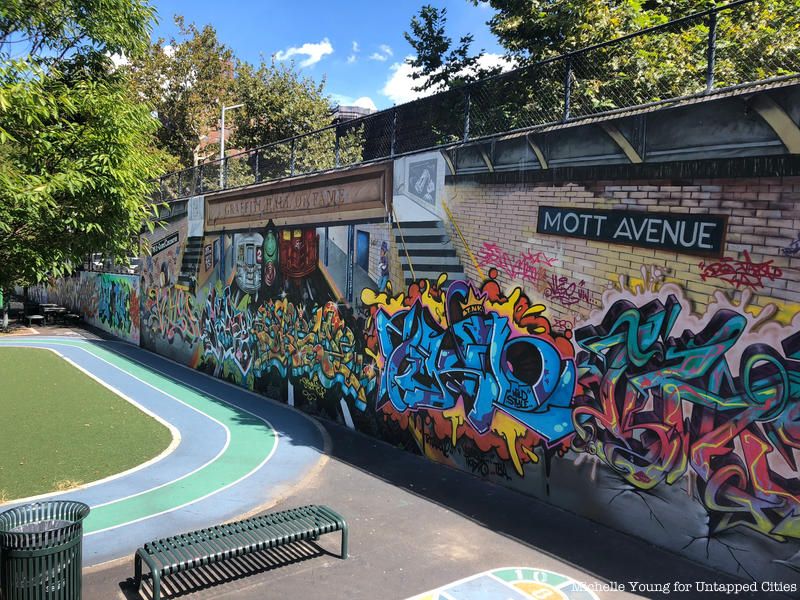 Graffiti Hall of Fame
Graffiti Hall of Fame
September is upon us, and with summer days being numbered, now is the perfect time to get out, enjoy the weather, and check out some of the new art installations popping up around New York City. From floating artwork to outdoor photography exhibits to traveling installations, this month has loads to offer. Located across all five boroughs in parks, on the streets, and within waterways, this month’s art installations present endless opportunities for exploring new places in New York City.
Read on to check out the must-see art installations in New York this month, and pick a few to check out yourself!

Oki Fukunaga, Hanger Crystal Structure, 2016, Courtesy of the artist and Governors Island Art Fair
The 11th Annual Governors Island Art Fair kicked off on September 1st and will be open every Saturday and Sunday through September 30th. Installations, featuring a great variety of artists, genres, and mediums, will be on display in eight historic homes on Colonels Row, where individual artists have their own designated space, and viewers can move in and out of the homes and engage in conversations with the artists themselves. This year’s fair will highlight around 100 artists from across the United States and around the world.

Following Aretha Franklin’s passing in mid August, a plethora of DIY tributes appeared in the two New York City subway stations that bear her name. To the chagrin of many New Yorkers and fans, most were swiftly removed by the MTA within a day. But timed with Franklin’s funeral in Detroit on Friday, the MTA installed black signs with the word “Respect” above every FRANKLIN AVE. tiling on both platforms in the subway station on Fulton Street along the Bedford-Stuyvesant/Crown Heights border in Brooklyn. This means there are about twelve of the tributes total.
The MTA, via a spokesperson, said in a statement that “We wanted to memorialize the outpouring of love from the community for Aretha Franklin. In consultation with local leaders, we agreed that ‘respect’ was a beautiful tribute and worthy message.” The signs were designed as a partnership between MTA Arts & Design and LeRoy McCarthy of Heterodoxx INC, who was responsible for the first spray painted tributes at this same station on the Franklin’s death was announced. He tells the website Patch, “It is great to honor Queen Aretha Franklin, and at the same time advance the significance of RESPECT. The impact of Aretha Franklin’s voice and legacy can continue to make a difference in society.”
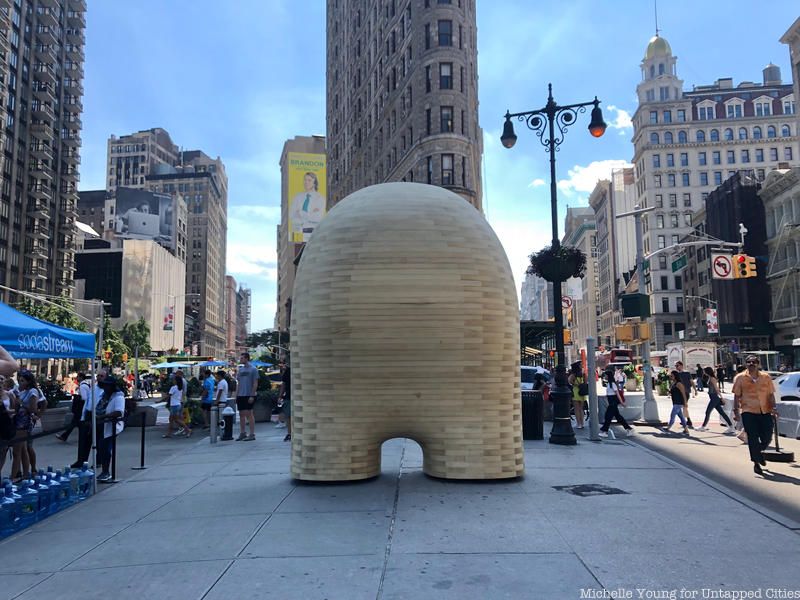
This recent installation at Flatiron Plaza North from mid-August is a public art complement to the latest exhibition at the Noguchi Museum in Long Island City. Made of accoya wood, “Link” by Jorge Palacios was inspired by the sculpture of Isamu Noguchi and intends this sculpture to “explores the relationship between scale and civic life,” according to the Museum. The Spanish artist who has studios in New York City and in Spain, has nine sculptures on view at the Noguchi Museum that “explore the laws of physics and motion on microscopic and macroscopic levels.”
Link by Jorge Palacios will be on view until November 6, 2018. Palacios’ exhibition at the Noguchi Museum will be up until January 20, 2019.
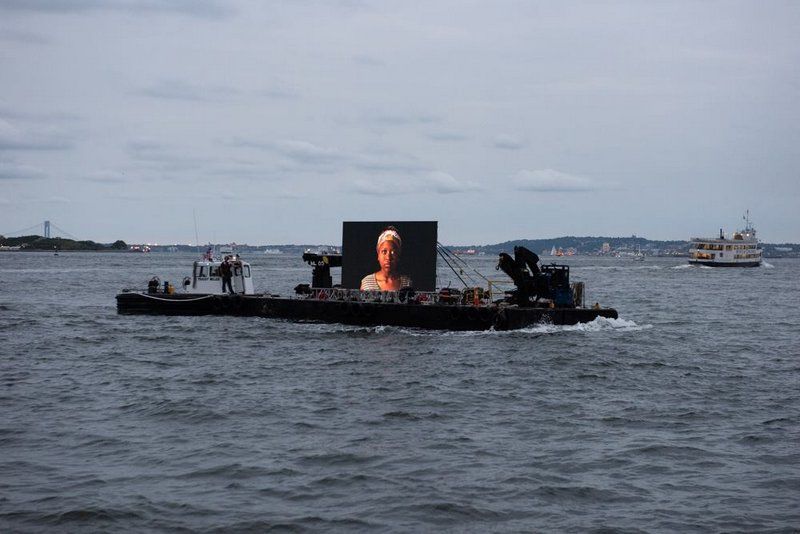
Photo by Kate Levy courtesy More Art
From September 20 to September 27, Night Watch, a floating installation created by artist Shimon Attie, will travel around the shores of Staten Island, Manhattan, Brooklyn, Queens, Roosevelt Island, Governors Island, Liberty Island, and New Jersey. This multi-media installation displays portraits of refugees and asylees on a 20-foot-wide by 12-foot-tall LED screen mounted on a slow-moving vessel. Notably, this installation will be traveling around during the United Nations Annual General Debate, in an effort to represent refugees of various backgrounds and push for support for immigrant rights.

The Graffiti Hall of Fame in El Barrio received its annual renewal again in late August. The street art hotspot in the playground of the Jackie Robinson Educational Complex between 106th and 107th streets is not usually open to the public, but each year, the executive director of the Hall of Fame, James Top, invites artists to execute new work on a specific theme. This year, the theme was “The Subway Edition,” focusing on the subway in the late 1980s. Read more about the Graffiti Hall of Fame here.
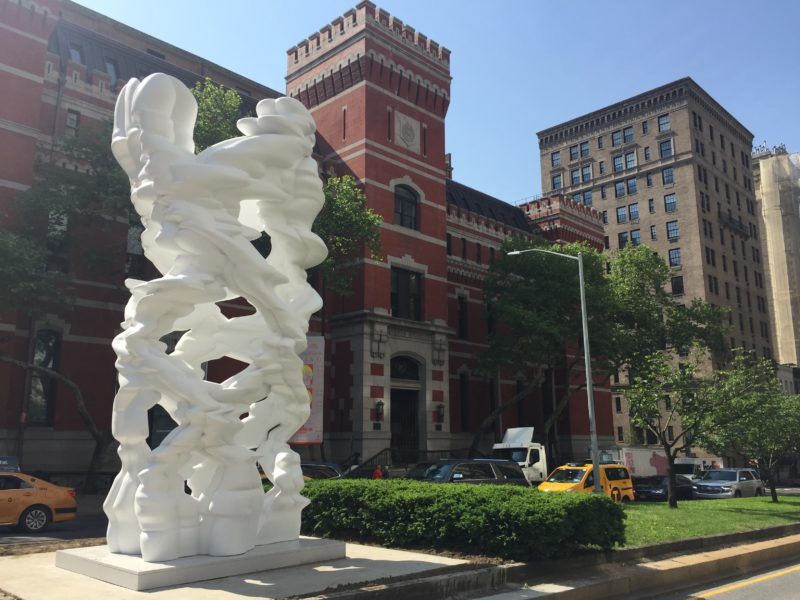
Photo courtesy of NYC Parks
Situated on the Park Avenue Malls between East 52nd Street and East 79th street are five immense art pieces that make up Tony Cragg’s Monumental Sculptures. These sculptures are located at 52nd, 57th, 67th, 72nd, and 79th Streets, and both enhance and stand out from the surrounding urban landscape. The pieces are made out of materials such as fiberglass, stainless steel, and bronze, and are meant to “defy gravity while giving the impression of upward motion and kinetic energy. In 2015, Tony Cragg had an installation in Madison Square Park.
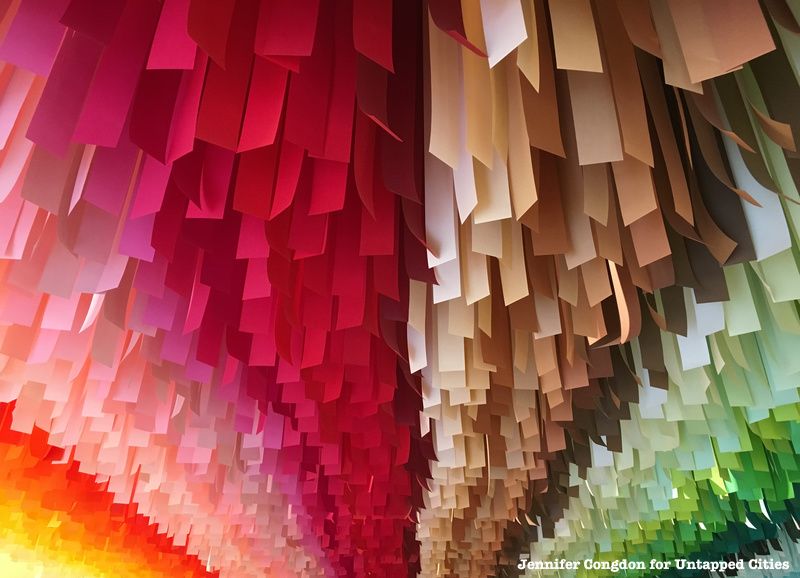
Display in the lobby of Color Factory
Mid last month, Color Factory, an interactive exhibit that celebrates color and creativity, debuted in SoHo with a new color palette curated from the streets of New York. Their goal is to encourage people to engage with color in a personal manner, one that prompts them to reflect on the colorful aspects of everyday life, from the purple flowers at the bodega to the orange objects of a construction zone, which are just two sources of Color Factory’s palette.
Color Factory consists of 16 participatory installations, including an enormous blue ball pit in which diving in is highly encouraged, a dance floor, and an interactive flowchart quiz that reveals your secret color. The exhibition fun even continues outdoors; Color Factory provides visitors with a map of 23 local businesses and organizations with instructions for embarking on your own scavenger hunt to see the colors of the neighborhood and collect some goodies.
Color Factory is a must-visit spot for all color enthusiasts, or just anyone who wants to have some fun, move around, and get some cool photos.
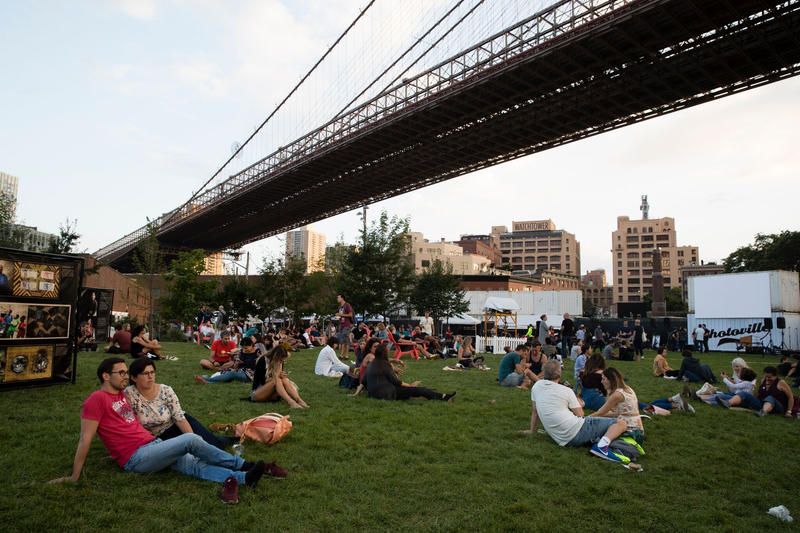 Photograph Courtesy of United Photo Industries / Alan Winslow
Photograph Courtesy of United Photo Industries / Alan Winslow
From September 13-23, Photoville, a free pop-up exhibition that transforms repurposed shipping containers into outdoor photography galleries, will return to Brooklyn Bridge Park for the seventh year in a row. This pop-up “village” exhibits work by over 500 artists in 85 exhibitions, such as Scenes Unseen, which features recently-discovered work by photographers who set out to capture the moods and moments of summer 1978 in New York. Last year, Photoville debuted an exhibition of photos that celebrate the NYC Ferry. Information about Photoville can be found here.
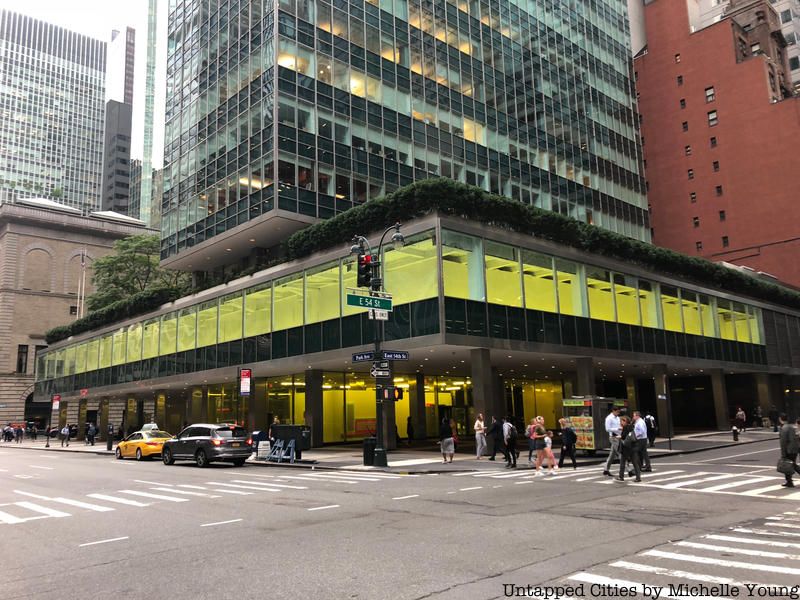
From September 20th, 2018 through December 2018, artist Peter Halley will bathe the lower level of the iconic Lever House in yellow – similar to what Halley did at Schirn Kunsthalle in Frankfurt, Germany. The exterior takeover will be part of an exhibition curated by the Lever House Art Collection that will take over the lower two floors of the building.
In this two-floor immersive installation, Halley uses the circuit-like compositions of his paintings as inspiration for the lobby’s layout, inviting viewers to feel as if they are walking through the space created by one of his paintings. “The installation is foremost a series of changing scales. The sweeping band of yellow light on the second floor can be seen at night from blocks away. The paintings in the first-floor lobby address the viewer at street level. Then within the lobby, the structure I built to support the paintings has an interior passageway, leading into two hidden rooms, invisible to passersby on the street,” says Halley. The exhibition includes six large shaped-canvas paintings as well as a sequence of hidden digitally-generated mural works.
The Lever House Art Collection has previously featured the work of Jeff Koons and a bronze union rat,
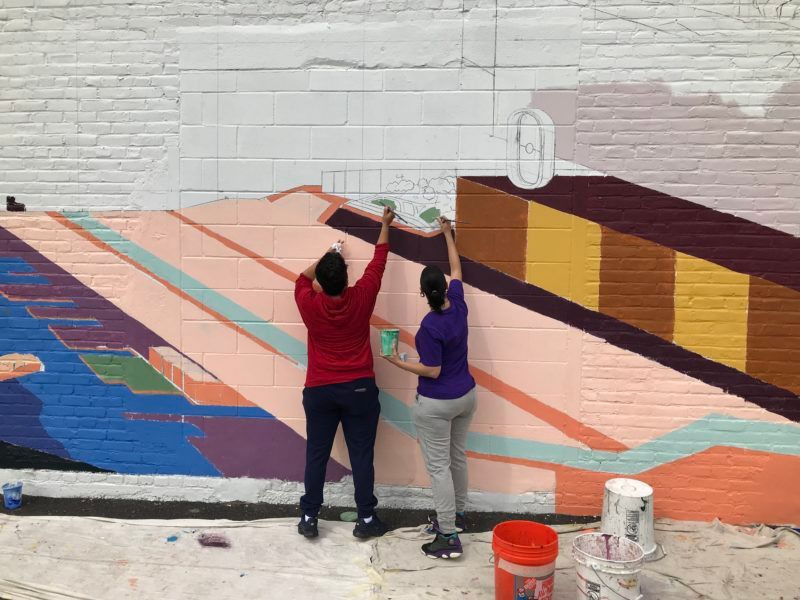
Mural in progress; photo courtesy of Iris Garcia and Sunshine Sachs
The New York City Economic Development Corporation (EDC) recently teamed up with Groundswell, a non-profit organization that connects artists and local communities, to create a new mural in Bush Terminal Park to beautify the Sunset Park neighborhood. The theme of the mural will be accessing the waterfront, both the working, industrial aspects and its natural beauty. Brainstorming for the mural began when the EDC held a visioning session to talk about what the theme means to them, and the imagery that they believe must be represented.
The mural will be unveiled on September 7 and can be accessed through the park entrance at 50th Street and First Avenue in Brooklyn.
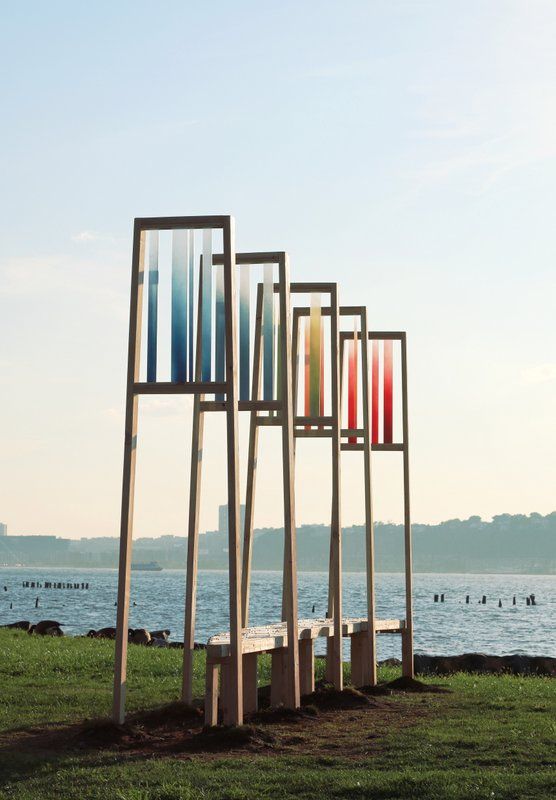
Photo courtesy Sarah E. Brook
Viewfinding, a large-scale public art installation in Riverside Park by Gowanus-based artist Sarah E. Brook, will feature a series of reclaimed lumber and cast-acrylic panels, with engraved text written by 26 queer-identified poets. The acrylic material is selected for its translucency and will shift in color depending on the sunlight and time of day. The poets selected include not only established ones, but also not yet published ones as well.
Viewfinding will be located along the Hudson River in Riverside Park at 67th Street It opens on September 9th, with an opening reception, artist talk and poets’ reading on September 22nd, and will be up until August 22nd, 2019.
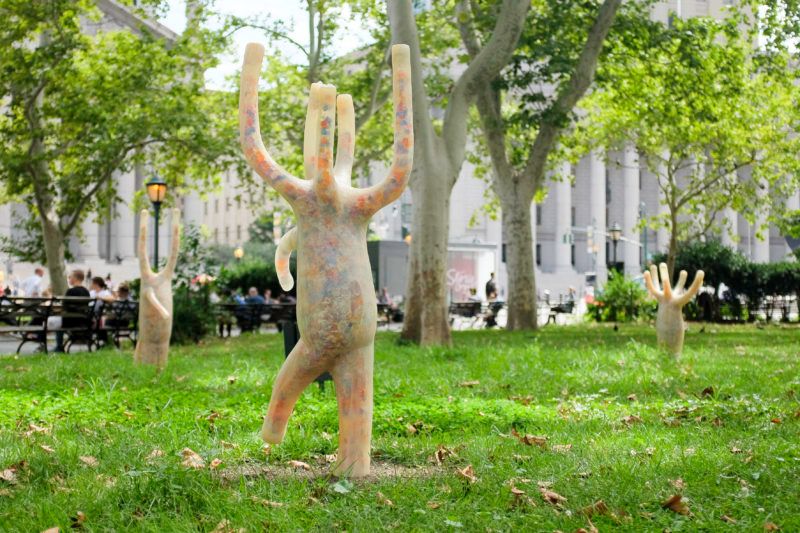
Photo by Daniel Avila courtesy of NYC Parks
Judith Modrak’s Our Memories, recently unveiled in Manhattan’s Thomas Paine Park, is “an evolving audience participatory installation” that aims to “physiologically generate a new collective memory.” The shape of the sculptures is inspired by neurons and contain cavities in which participants place a color-coded stone. These memory stones each represent one of six emotions: joy, anger, love, sadness, fear, and surprise. The aim of the piece is to create a symbolic memorial composed of thousands of individual memories.
Thomas Paine Park is located in the former Five Points and Collect Pond area that is now home to the New York Supreme County Courthouse and the Thurgood Marshall United States Courthouse.
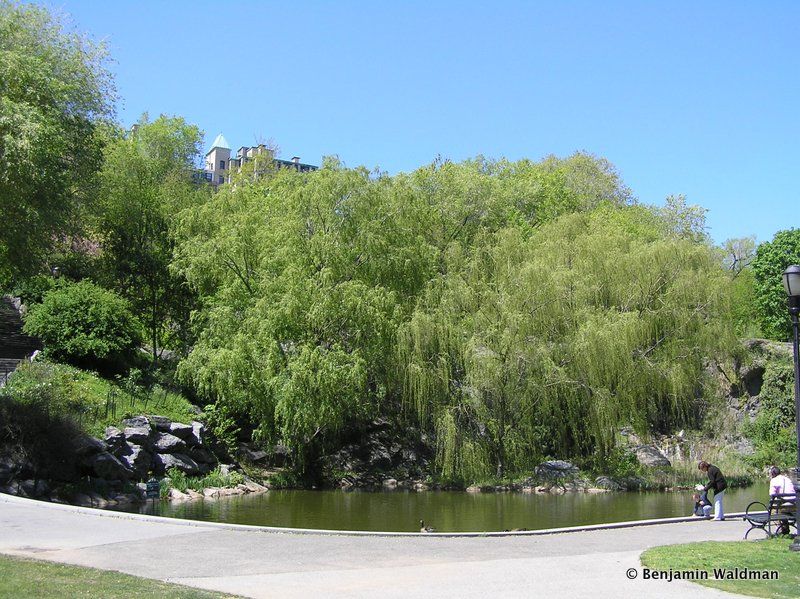
Morningside Park, where the installation will take place
Morningside Lights is an arts event led and produced by the Professional Arts Workshop and Columbia University’s Arts Initiative, where the public is invited to workshops on building lanterns, which then culminates in an illuminated procession in Morningside Park. This year’s installation is titled Flight and will feature a flock of illuminated birds that, as they are carried through the night sky, will carry suitcases in reference to ‘the power and precariousness of migration on a changing planet” and to celebrate “the vitality and diversity that migrations have always brought to New York.”
Lantern-building workshops will take place from September 4-7 in Miller Theatre at Columbia University. On September 8th in Morningside Park, a family craft table will be open from 11 a.m. to 1 p.m. and the Morningside Lights Procession will take place at 8 p.m.
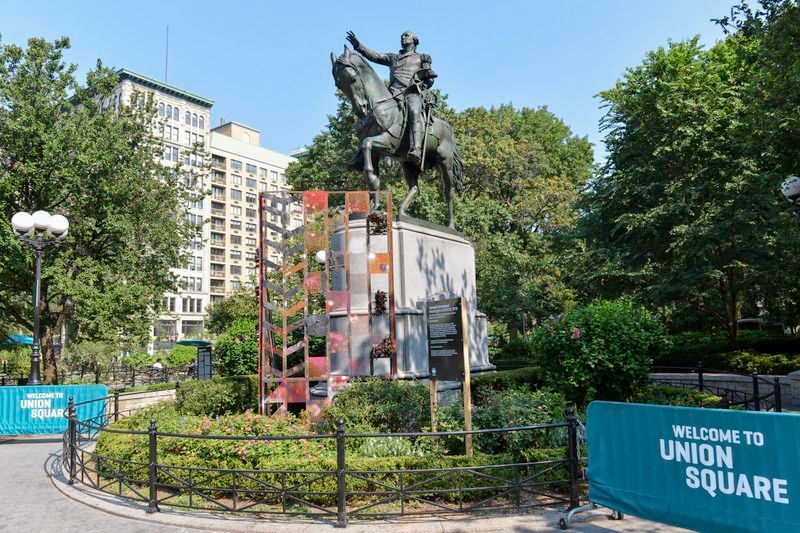
Photo by Daniel Avila/NYC Parks
The George Washington statue in Union Square is considered the first ever statue on New York City parkland, according to NYC Parks. From now until October 30th, the work “Washington 20/20/20” by Kenseth Armsted will serve as a companion to the statue. The form of the sculpture is inspired by the colorful frescoes of the homes in Tiebele, Burkina Faso, the royal court of the Kaseena people. The name of the art installation “references the 20% of the colonial population that were enslaved Africans; the 20,000 slaves in New York State in 1776 when Washington retreated from New York City; and the 20% of Washington’s continental army that was African at Yorktown, Virginia, where he was finally able to defeat the British in 1781,” according to an NYC Parks press release.
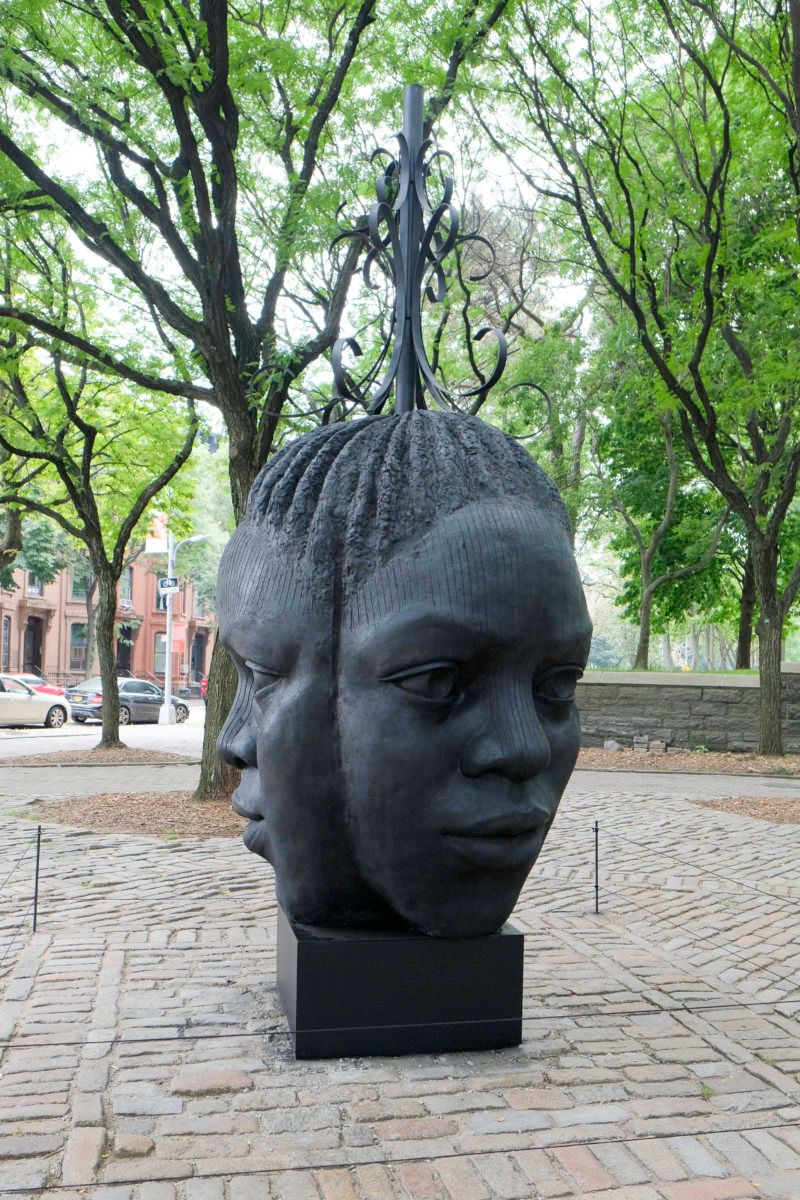
Photo by Daniel Avila courtesy of NYC Parks
On August 25th, Adorn Me, a piece created by UNIQLO Park Expressions Grant recipient Tanda Francis, was unveiled in Brooklyn’s Fort Greene Park. Francis explores African presence in public space as a powerful force of beauty and cultural relevance, drawing on African sculptural tradition and portraiture, as well as Victorian and colonial ornamentation. She seeks to provide “a healing message during a time of heated debate over monuments erected as symbols of oppression and control” in this installation, which will be on view until next summer.
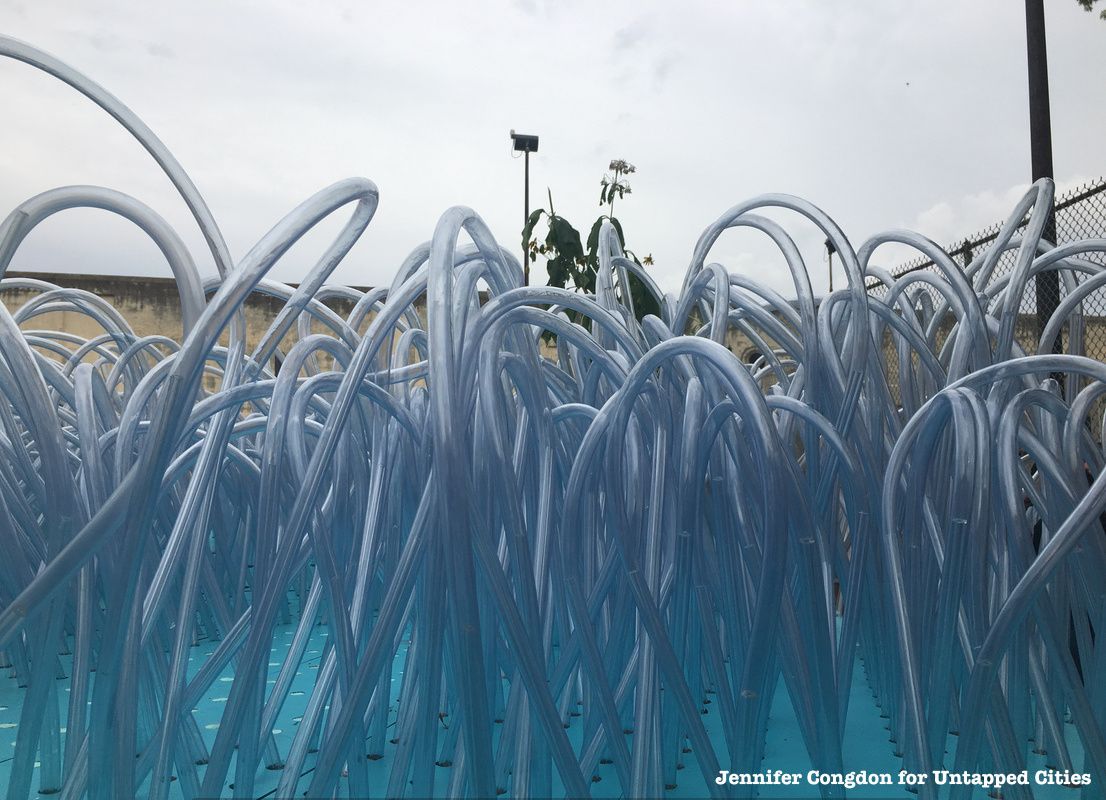
‘Finding Tibbetts’ piece in progress
This month a mobile wetland titled Finding Tibbetts will be traveling around the Bronx to build support for the Daylighting Tibbetts Brook project, an environmental initiative by City as Living Lab to unearth the now-buried Tibbetts Brook in order to minimize water pollution, reduce flooding, and reinvigorate the surrounding ecosystem. Finding Tibbetts will make multiple stops across the Bronx this month on the 16th, 23rd and 30th, specifically along the route of the stream, where visitors can see the model cross section of the brook, with water tubes, a real marsh, and an inhabitable section that invites visitors to enter and reflect on their own position in the environment. The wetland will also makes stops in October on the 7th and 14th. To get the detailed schedule, sign up for the mailing list at the City as Living Lab website.
Accompanying this project is Bob Braine’s Estuary Tattoos. Braine uses ink to paint the historical map of Tibbetts Brook on participants’ bodies, giving them a temporary piece of artwork on their own body in hopes of fostering people’s connections to the landscape, and most importantly, raise awareness about the daylighting project.
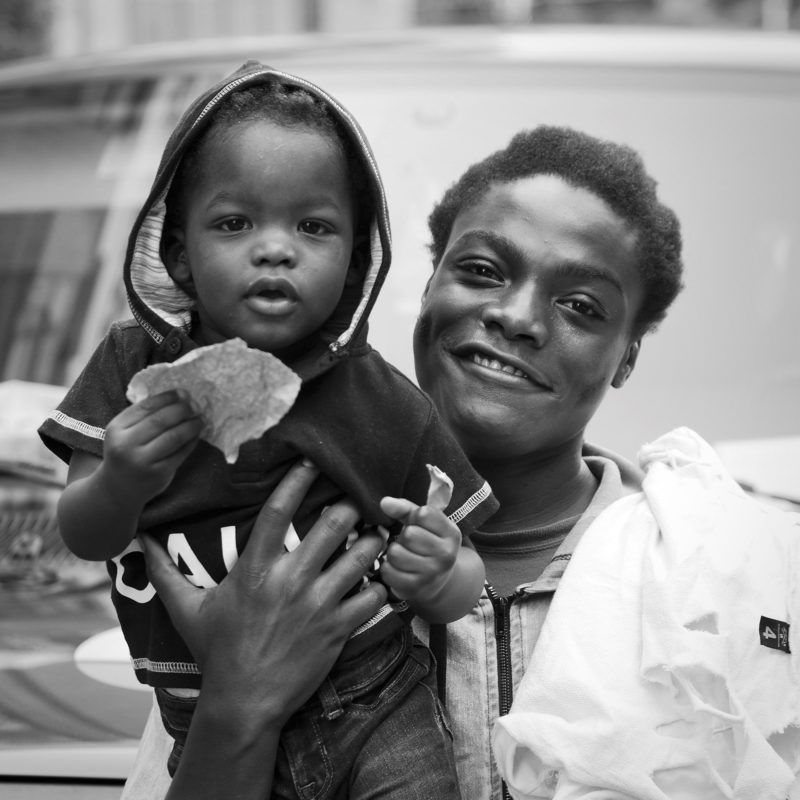
Image courtesy of NYC Parks via Queens Museum
David Flores’ Nueva Bronx: 21st Century Families project, which will take place in the Bronx’s Railroad Park daily, celebrates family as being central to the human experience and essential in forging community connections. The project is a response to nationalist movements which attempt to dehumanize immigrant families. Flores will be offering on-site photography, printing, display and digital sharing in the park to families and friends who wish to be photographed. People of all ages are encouraged to come as a family, be formally photographed, and receive a free large format print.
Nueva Bronx: 21st Century Families is a partnership between ArtBuilt, NYC Parks, Queens Museum, with support from the National Endowment for the Arts, along with local Bronx partners including The Dreamyard Project, The Bronx Defenders, and WHEDCo.
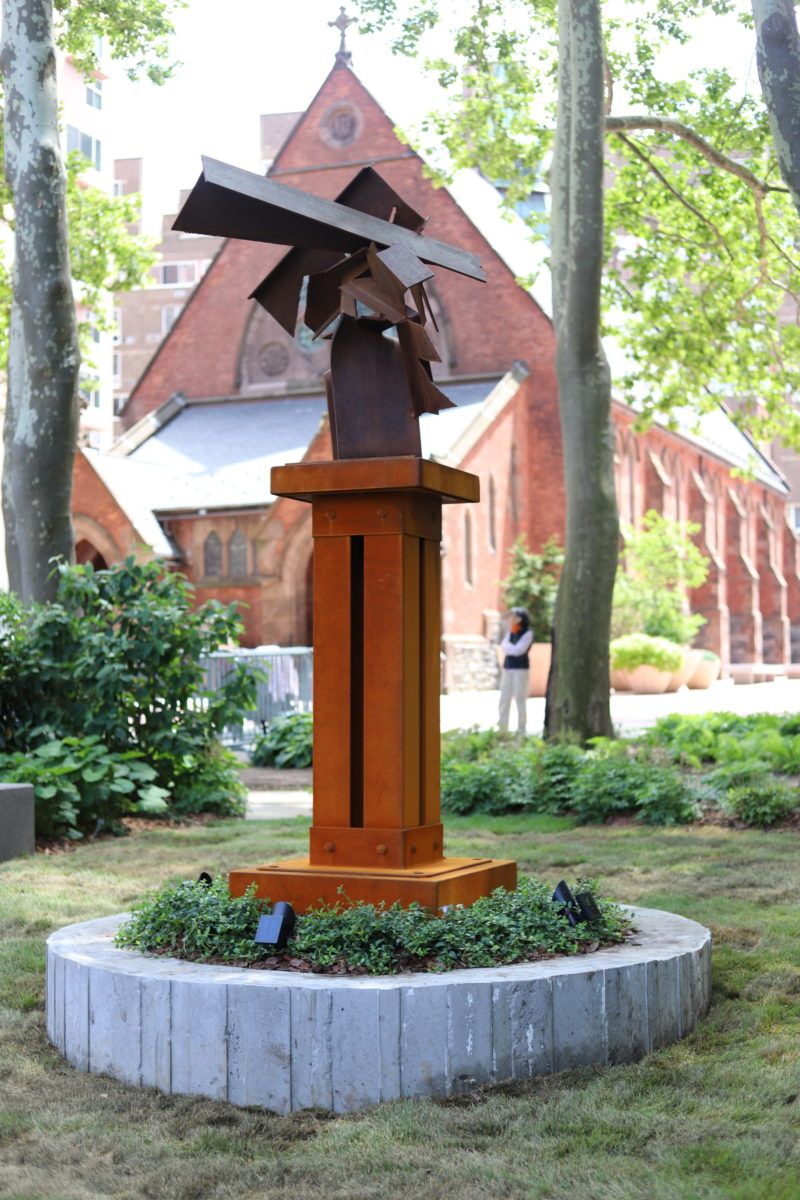
Photo courtesy of Roosevelt Island Operating Corporation
In a commitment to making their island an Island of Art, the Roosevelt Island Operating Corporation and the Roosevelt Island Visual Art Association came together to form a plan for creating a two-mile-long “art trail” from the north to the south of the 157-acre island for both residents and visitors to enjoy.
Installations at FDR Four Freedoms Park at the south end of the island have begun to form the trail, and earlier this summer, the newest stop on the trail- the Good Shepherd Plaza Sculpture Plinth- opened to the public. The plinth’s inaugural sculpture is Michael Poast’s Saecula Saeculorum, named after the Latin phrase for “without end’ in reference to the fact that the sculpture will continue to evolve over time from the effects of weather and time.
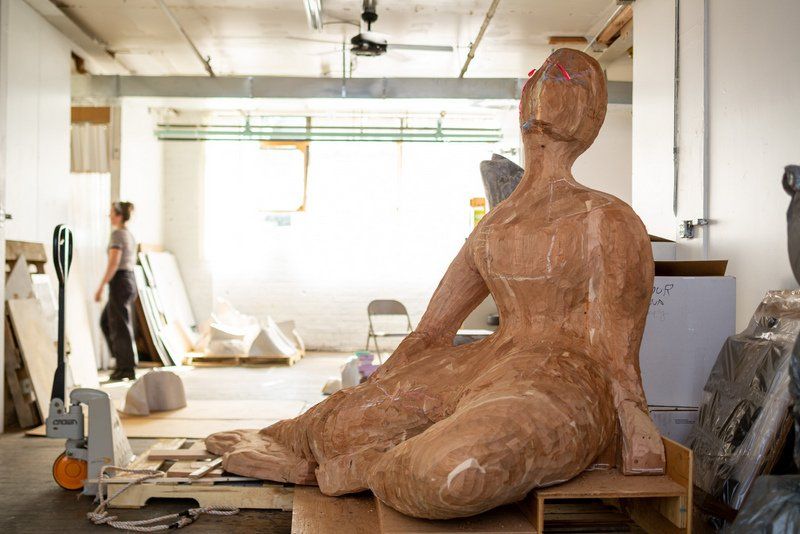
Work in progress of one of the sculptures that will go into Madison Square Park. Photo courtesy Arlene Shechet Studio
From September 25th, 2018 to April 28th, 2019, Madison Square Park will turn its main plaza into a sculpture court with works in wood, porcelain, and cast-iron. The site-specific installation by Arlene Shechet entitled “Full Steam Ahead” hopes to overturn the traditional notion of a sculpture court. According to the Madison Square Park Conservancy, Shechet’s work “riffs on the concept of the staid sculpture court—a mainstay of traditional museum display—as a cloistered experience.” Instead, the human-scale sculptures invite gathering, interaction and seating. Arlene Shechet stated about the project: “My hope has been to reimagine the hardscape of the Park with delight and surprise. New Yorkers rely on the sidewalks, the pavement, and the street as the core of their urban lives. Full Steam Ahead becomes a lively and human amphitheater, softening the hardscape through sculptural intervention evocative of 18th-century garden landscapes.”
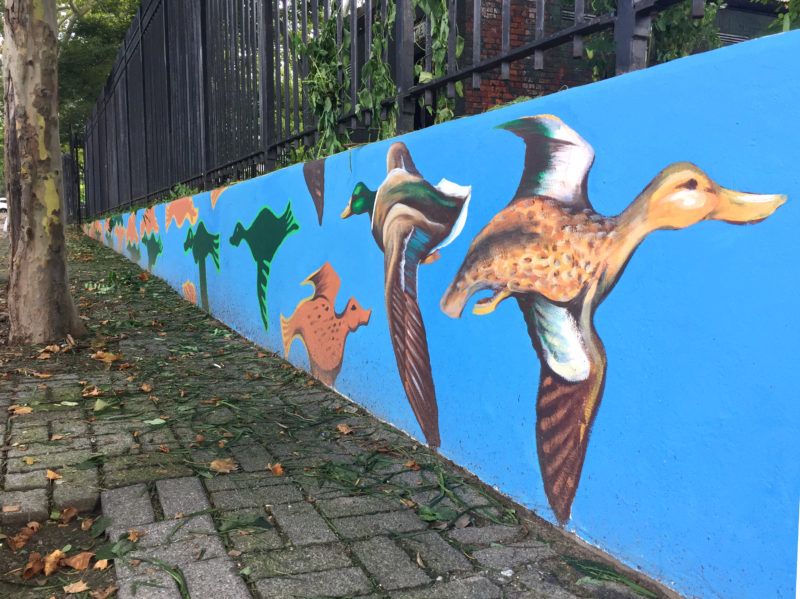
Photo courtesy of NYC Parks
At the Jacob H. Schiff Playground in Hamilton Heights, the walls have been covered with paintings of birds in order to raise awareness about bird species that are impacted, and mainly threatened, by climate change. This mural, titled Migrations, was a collaboration between Teaching Artist Jessie Novik, Paid Youth Apprentices, and playground volunteers.
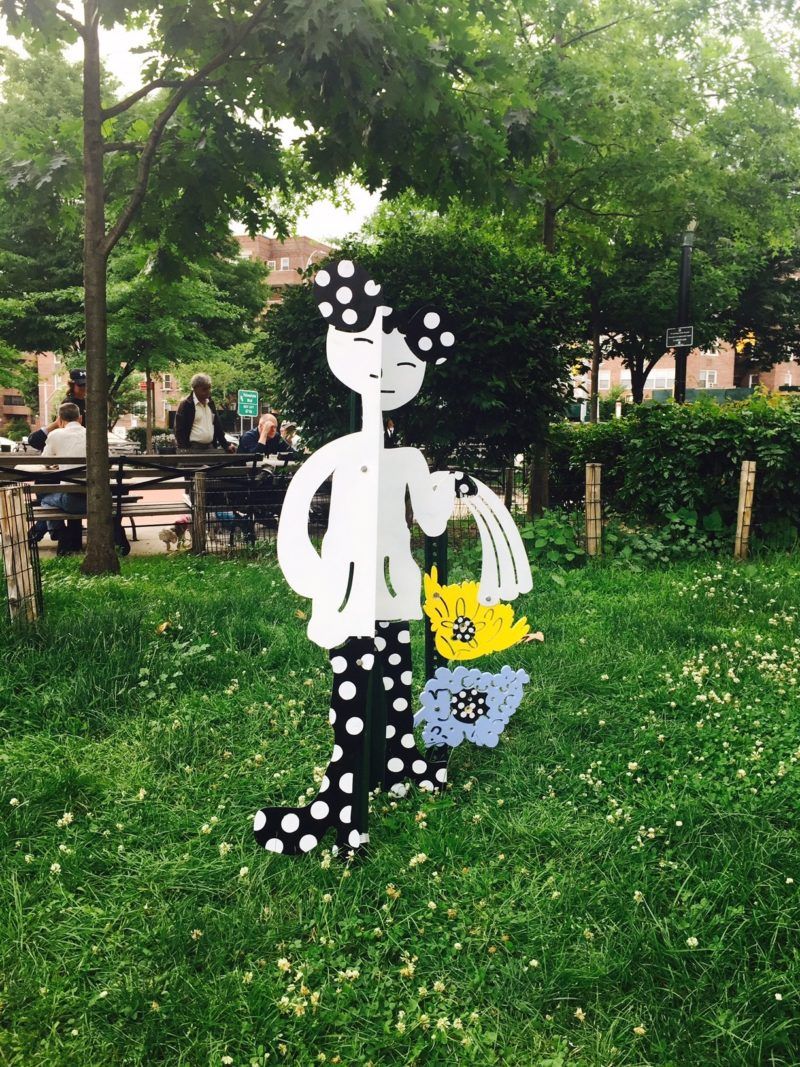
Photo courtesy of NYC Parks
Conceived by Yvonne Shortt and Mayuko Fujino, Functional Bodies is a project that engaged community members, like PS99 students and senior citizens, in its creation in MacDonald Park in Queens. The sculpture, with its creative collaboration with the community, aims to encourage more people to volunteer at the park. The sculpture depicts a girl and a dog, composed of parts that can be used in gardening, along with flowers created by community members of all ages.
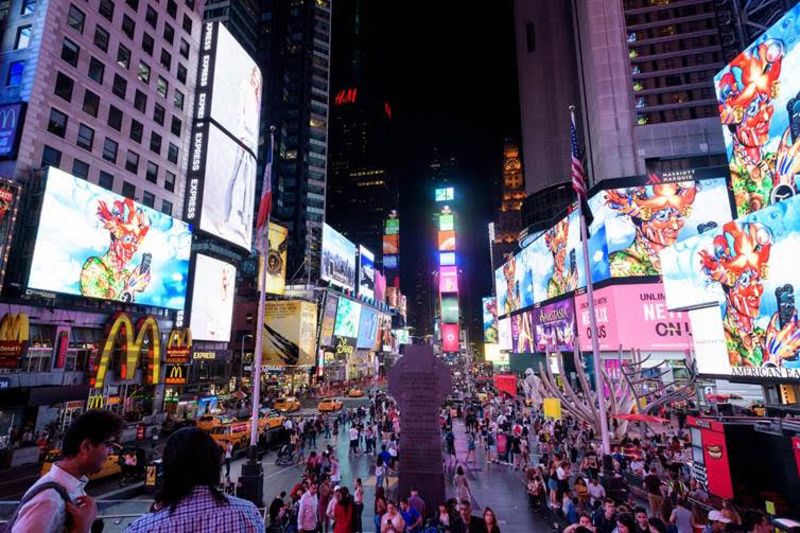 Carla Gannis’ Portraits in Landscape, Courtesy of Ka-Man Tse for Times Square Arts
Carla Gannis’ Portraits in Landscape, Courtesy of Ka-Man Tse for Times Square Arts
Times Square’s Midnight Moment features work by animator Jodie Mack for the month of September, with a work called Posthaste Perennial Pattern. Each day all month, from 11:57 p.m. to midnight, handmade 16mm films will be shown. According to Times Square Arts, “Frequently made with collaged domestic materials, [Mack’s] work explores the relationship between fine-art abstraction and mass-produced, decorative imagery.”
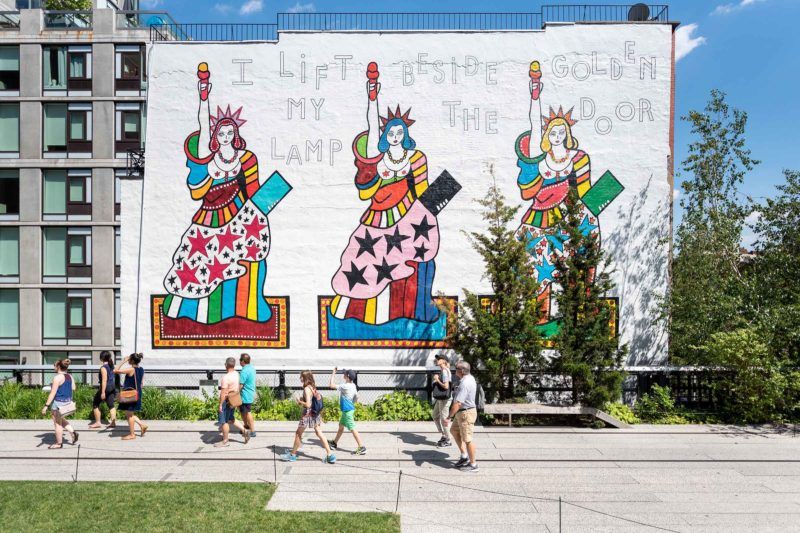
Photo by Timothy Schenck courtesy of Friends of the High Line
Dorothy Iannone’s mural I Lift My Lamp Beside the Golden Door debuted on the High Line near West 22nd Street earlier this year. The mural features three colorful interpretations of the Statue of Liberty accompanied by the words “I Lift My Lamp Beside the Golden Door”. The piece pays homage to the final line of Emma Lazarus’s poem “The New Colossus”, which is engraved on the bronze plaque mounted inside the Statue of Liberty’s pedestal.
Each statue painted in this mural is shedding a single tear, evoking the current polarizing debates surrounding immigration and disputed symbolism of the Statue of Liberty in relation to immigration policy. The work will be on view until March 2019.
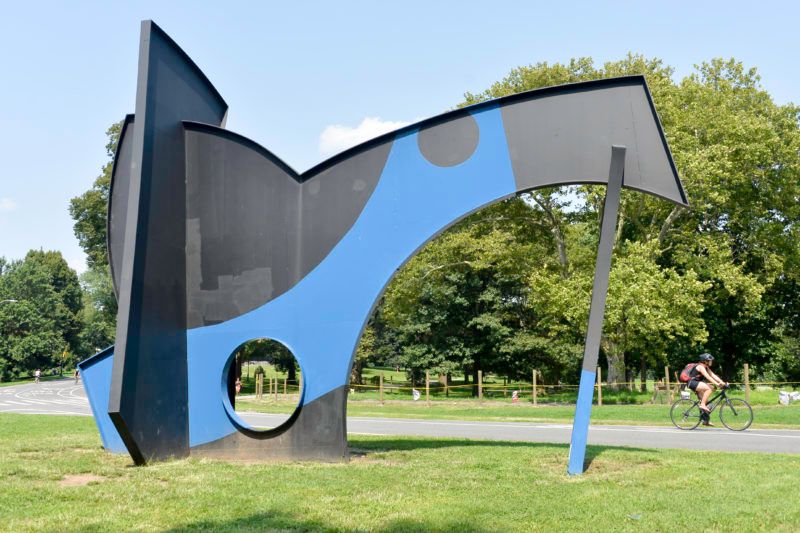
Photo by Daniel Avila courtesy of NYC Parks
Up until October 23rd, Fitzhugh Karol’s Searches and Reaches will be on view in Grand Army Plaza within Brooklyn’s Prospect Park. The installation is composed of two sculptures featuring colorful intersecting steel shapes, which are meant to evoke the lines of stairs and hillsides. The size and abstract nature of the shapes are meant to prompt viewer interaction and remind us of our imprint on the landscape.
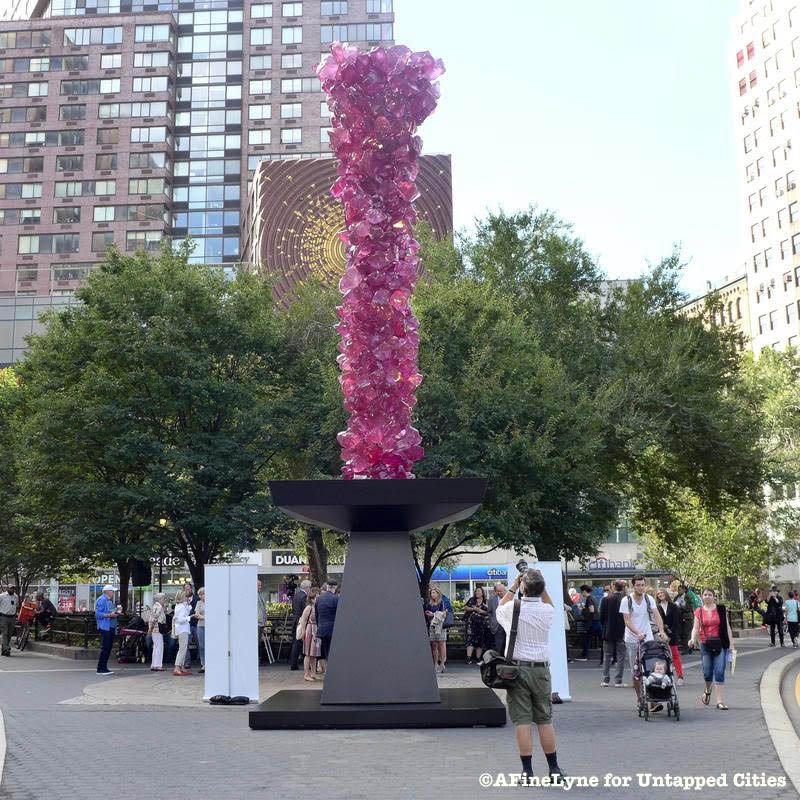
Sculptor Dale Chihuly’s Rose Crystal Tower is nearing the end of its time on view in Union Square near 14th Street. The 31-foot tall sculpture, which some believe resembles a stick of pink rock candy, consists of thousands of layers of pink crystals, held together with a glass-like resin. Rose Crystal Tower itself is 22-feet tall, and will be perched on a nine-foot base. The materials used to create this piece are meant to withstand the harshest of urban elements. Rose Crystal Tower by Dale Chihuly is presented by Union Square Partnership, NYC Parks Department, and Marlborough Gallery.
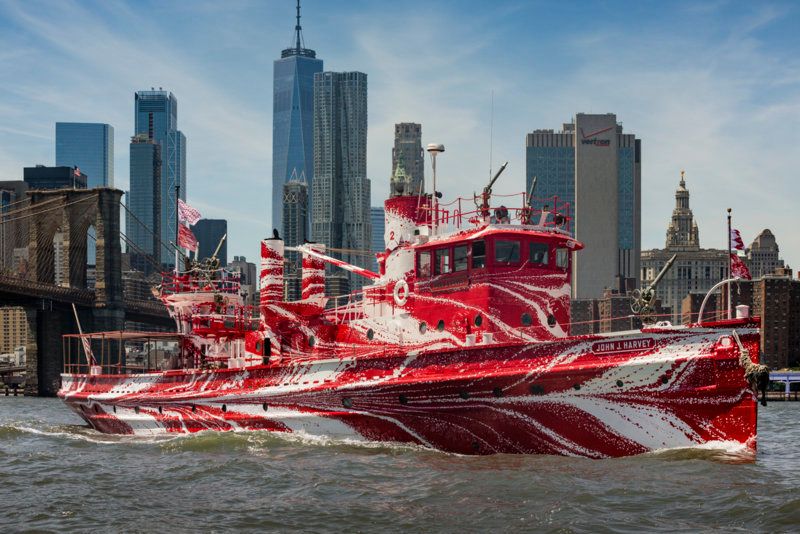 Photo by Nicholas Knight courtesy of Public Art Fund
Photo by Nicholas Knight courtesy of Public Art Fund
Flow Separation by New York artist Tauba Auerbach is a piece that converts the historic Fireboat John J. Harvey into what the Public Art Fund calls a “contemporary dazzle ship.” The concept of the “dazzle ship” dates back to World War I, when British painter Norman Wilkinson came up with the idea to strategically paint war ships in a way that created optical illusions that distorted the forms of the boats. Thus, they puzzled the soldiers on enemy ships who struggled to track the movements of the British ships.
2018 marks the anniversary of the end of World War I, and Auerbach’s installation prompts us to reflect upon this history. The piece evokes themes of innovation and abstraction, for Auerbach was inspired by the forms of objects as they move through water. She employed the method of transferring ink on water onto paper to achieve the pattern on the display boat.
Flow Separation will be on view through May 12, 2019. The initial set of free boat trips sold out quickly but the Public Art Fund is now releasing tickets on upcoming Tuesdays for various dates through October. Tickets can be purchased on the Public Art Fund website. You can also keep an eye on the fireboat’s calendar to see when registration for future rides open up.
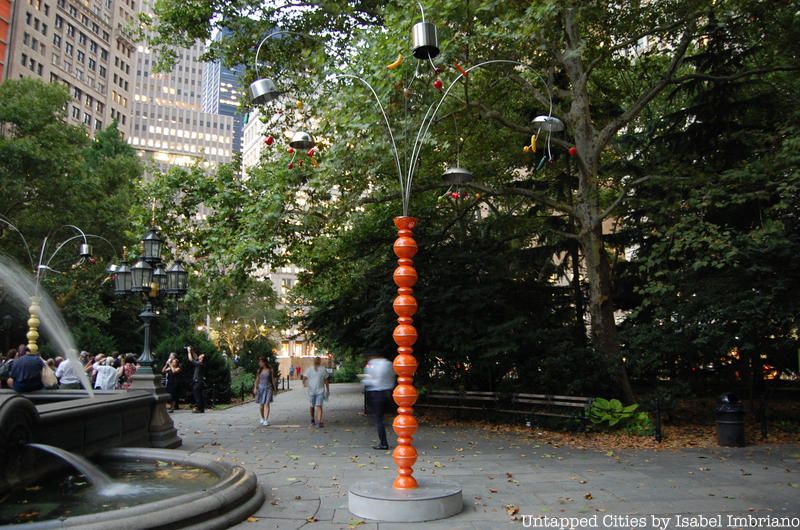
In August, Public Art Fund unveiled five new sculptures by New York artist B. Wurtz in City Hall Park, in an exhibition titled Kitchen Trees. Over the past 50 years, Wurtz has become well-known for working with objects that make up people’s basic needs, mainly objects that evoke themes of food, clothing, or shelter. In this installation, Wurtz expands this vision, taking everyday items like plastic bags, cans, shoelaces, and wood and arranging them in such a way that transforms this pile of objects into an art piece that “hovers between precarious fragility and formal monumentality.”
Specifically, the artist uses objects to create sculptures that resemble trees, from the trunks to the branches composed of kitchenware and plastic fruit. This installation is the first time that Wurtz has moved his work outside of the gallery, specifically to the urban landscape, where people and the built environment intermingle. The exhibit will be on view until December 7, 2018.

At 85 Broad Street, a building full of historical secrets if you know where to look, has installed an impressive piece of artwork on the sidewalks encircling the building in Lower Manhattan. It’s inspired by the 1767 map, “The Plan of the City of New York in North America” made by British military officer Bernard Ratzer from 1766 to 1767. Under this map, our readers may recall, there’s a yellow brick outline that marks the walls of Stadt Huys, the original city hall, one of many signs of Dutch New Amsterdam that still remain.
The map, designed by FXCollaborative, made by Jessup Manufacturing Company and printed by National Marker is made of a foil-backed proprietary material called Asphalt Art, and laid down piece by piece. Fun things of note on the map besides Stadt Huys and Lovelace Tavern, where you can still see the archaeological excavation of the tavern through glass, are the now-lost Princess Street, the old synagogue (original the old mill of Dutch New Amsterdam, home to the congregation of the Sephardic Jews who arrived in 1654 from Spain and Portugal), and the old slips of Lower Manhattan.
You can discover this and more on our tour of the Remnants of Dutch New Amsterdam!
Tour of The Remnants of Dutch New Amsterdam
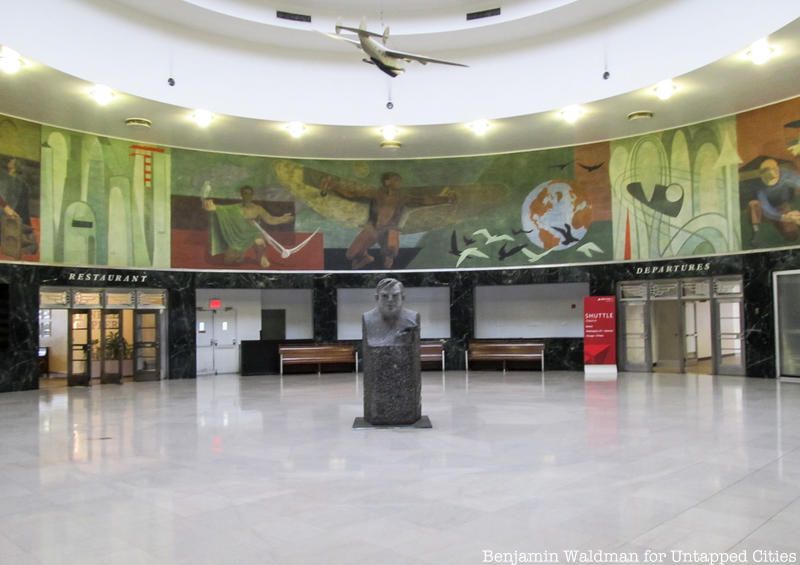
While this installation is not necessarily outdoors, it still made the list because it is in an airport, which is not exactly the most conventional place for public art, and is far outside the realm of museums and galleries. Sandra Lopez-Monsalve, multimedia producer and sound artist, has begun work on her latest project, Sounds of LaGuardia. The piece is referred to as a “sonic exploration of LaGuardia Airport“, in which Lopez-Monsalve records the sounds of travelers moving through the airport in conjunction with another spoken component detailing the histories of the airport. Rather than creating a visual display for people to observe, Lopez-Monsalve seeks to directly engage with travelers; the art piece is both the act of story gathering and the resulting sound compilations that are uploaded to the project’s website.
Voices of LaGuardia Week 1
There are three components to the project: Voices of LaGuardia, which asks travelers a reflection question regarding travel; the Sonomap, in which ambient noises of the airport are recorded and uploaded to a digital map where listeners can choose from the various locations; and Stories of LaGuardia, which features radio-style stories about the history and visual aspects of the airport.
Lopez-Monsalve will be working in various locations around the airport until September 30. The website’s calendar is consistently updated with the times and dates of the artist’s open studios.
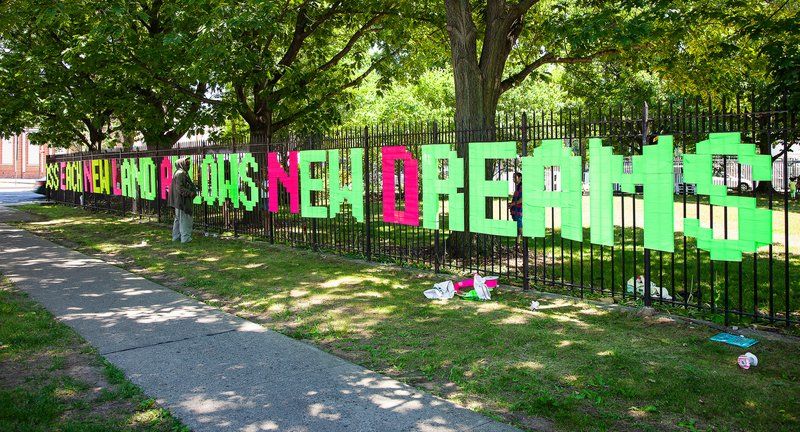
Photo courtesy of Michael Piña
Until next summer, Brooklyn Hi-Art! Machine’s artwork titled Fence Weaving will be on view at the Fidler-Wyckoff House Park as part of the Nou La- We Reach! exhibit. Fence Weaving, and the larger exhibit as a whole, immerses viewers in stories and artwork that highlight pairs of themes surrounding Caribbean migration: innovation and preservation, migration and displacement, and resistance and becoming. The exhibit showcases the stories of individuals from communities like Brownsville and East Flatbush to explore the ways in which the cultural fabric of Brooklyn has been shaped by migration.
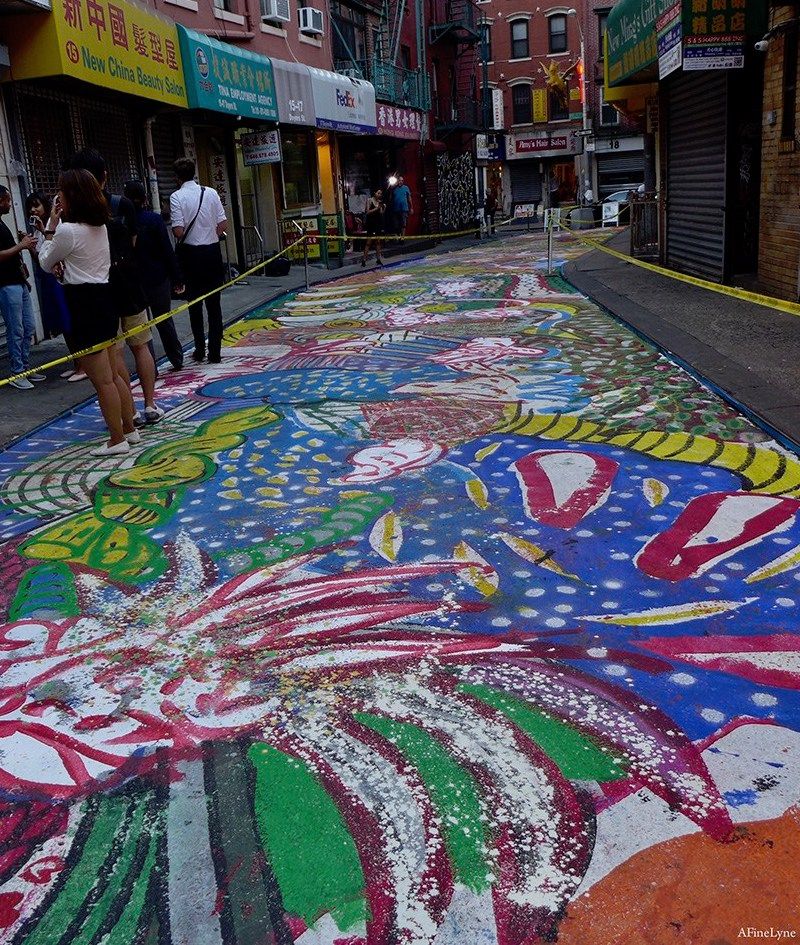
Photo courtesy of AFineLyne
Beginning August 1 and running through November 2018, Chinatown‘s Doyers Street will be blocked off from traffic between the hours of 10 am to 9 pm to create a pedestrian plaza. The highlight of the project will be an art piece titled The Song of Dragons and Flowers, artist Chen Dongfan’s almost 5,000 square-foot street painting that covers the street.
Dongfan was inspired by the history of Chinatown, which he describes as simultaneously being “full of hardship, but also full of love.” He evokes the immigrant experience, from cultural exchange to forging a place to call home, and utilizes the visual symbol of the dragon to represent the Chinese history that has shaped the neighborhood, tumultuously in some cases, and continues to endure to this day.
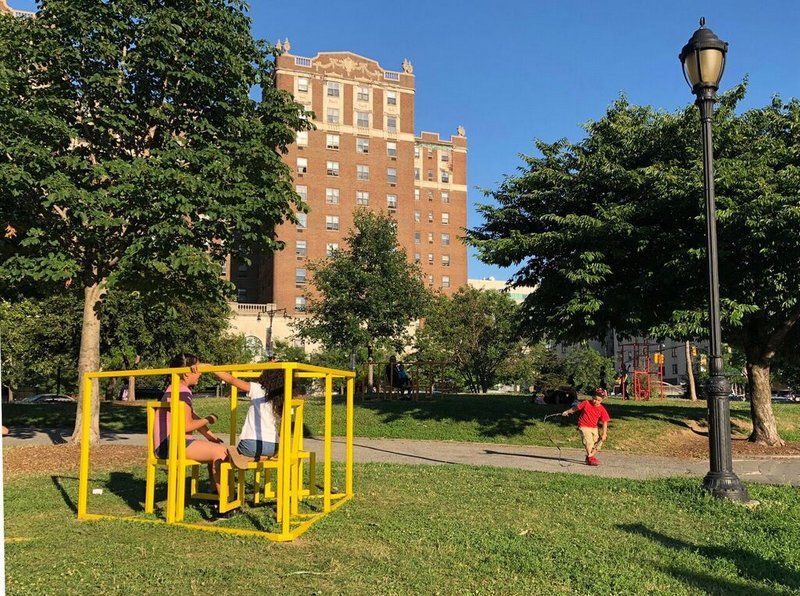
Photo by Dionisio Cortes Ortega courtesy of NYC Parks
Last month, Sitting Together, created by artist Dionisio Cortes Ortega, opened to the public in the Bronx’s Joyce Kilmer Park as part of the UNIQLO Parks Expression Grant program. Purposely placed by the neighboring Bronx Supreme Courthouse, the installation subverts the established proceedings of courtroom cases, prompting viewers to consider the ways in which conflicts, whether between individuals or the law, are resolved in a systemized manner that oftentimes doesn’t encourage empathy and understanding. The sculptures place the plaintiff and defendant within modified witness stands to encourage these qualities of empathy and understanding. Furthermore, the color and seating direction in each sculpture addresses the severity of the conflicts.
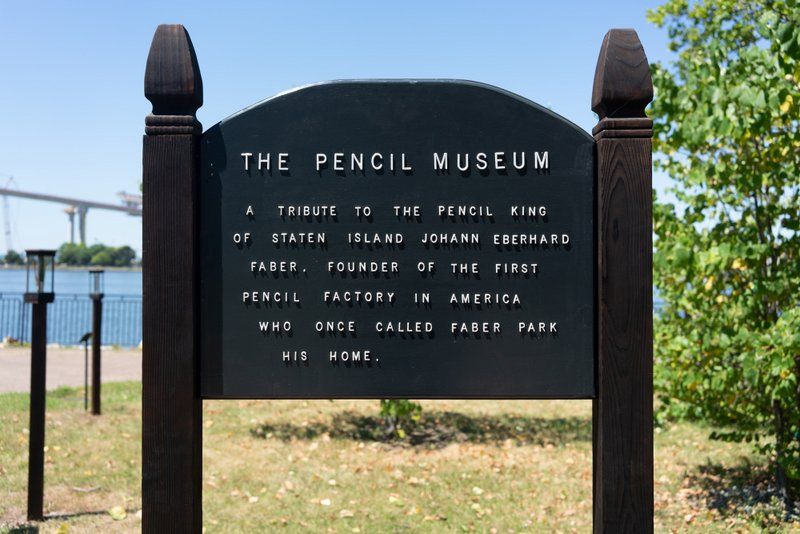
Photo by Jackie Mock courtesy of NYC Parks
On Staten Island’s Faber Park, artist Jackie Mock has installed The Pencil Museum, an exhibit that educates viewers about a somewhat obscure slice of New York history. Featuring hand-crafted cases that display antique pencils and writing instruments, the piece pays homage to the influential Eberhard Faber Pencil Company. When it was founded, the factory was the only one of its kind in America, and eventually created one of the most commonly used goods, all manufactured in New York. Faber Park was once the site of Faber Mansion, the property of entrepreneur Johann Eberhard Faber, the “Pencil King of Staten Island”.
Fun fact: the Eberhard Faber Pencil Company Historic district in Greenpoint, Brooklyn is one of the smallest in New York City, and more information can be found on our list of the 10 Smallest Historic Districts in NYC.
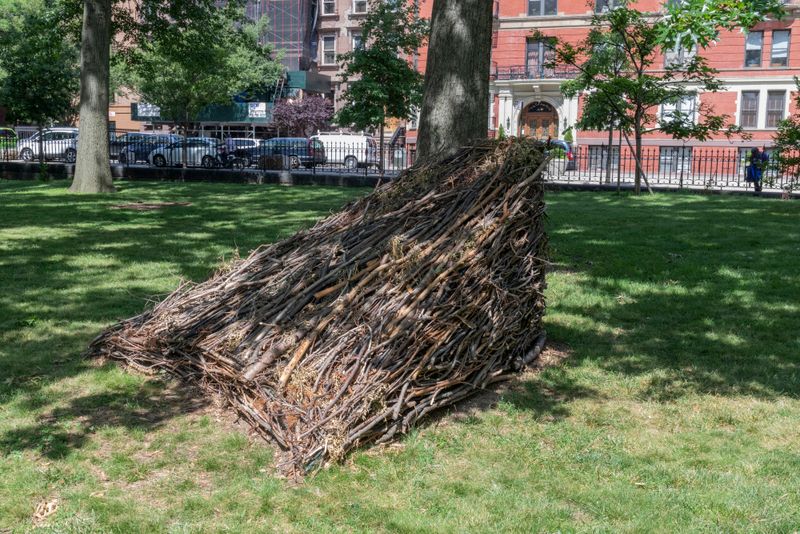
Photo by Adam Reich courtesy of the artist and Susan Inglett Gallery
Maren Hassinger: Monuments is an installation in Marcus Garvey Park and sponsored by the Studio Museum in Harlem that runs from through July 10, 2019. The exhibition features eight site-specific sculptures by artist Maren Hassinger who used branches to create sculptural forms that evoke aspects of the park landscape, like an oval near the pool, for instance.
Because she is a Harlem-based artist, Hassinger has been associated since the Studio Museum since the 1980s. With Monuments, she took great care to make it “a project made in Harlem and for Harlem.” Specifically, she created the works with volunteers from the Studio Museum’s Teen Leadership Council and the Expanding the Walls program.

Image courtesy of James and Karla Murray
James and Karla Murray’s exhibit Moms-and-Pops of the L.E.S. is part of 10 Uniqlo Park Expressions that are on view across the city. This piece is a pop-up that debuted last month in Seward Park on the Lower East Side. Moms-and-Pops is a life-sized structure that displays four large photographs of mom-and-pop ships that have closed in the Lower East Side, such as Cup & Saucer and Chung’s Candy & Soda Stand.
The installation seeks to highlight the disappearance of small businesses like bodegas, coffee shops, luncheonettes, delis, and newsstands that used to be numerous in the Lower East Side. The artists state that the piece seeks to represent the “small businesses that were common in the Lower East Side and helped bring the community together through people’s daily interactions.”
A combination of metal and wooden materials makes the sculpture weather-proof and capable of lasting the entire year, perhaps a nod to the legacy of these now extinct businesses of the Lower East Side.
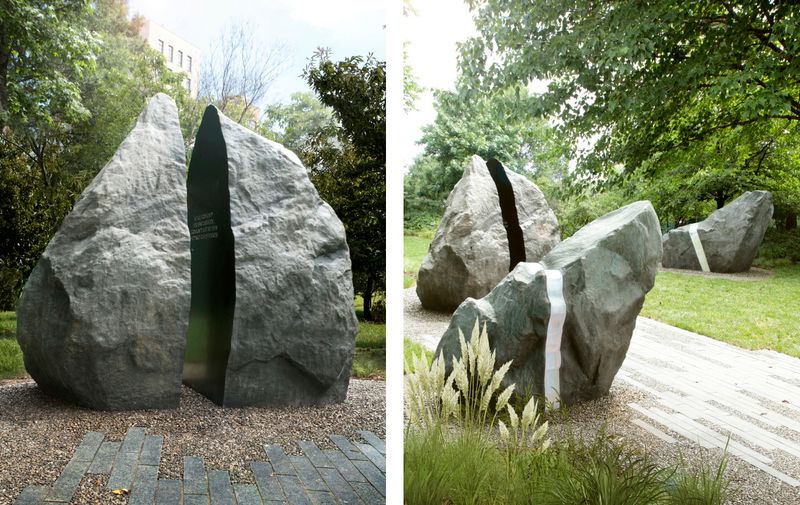
Photo by Anthony Goicolea
In late June, artist Anthony Goicolea opened the New York City’s first LGBTQ memorial in Hudson River Park. The work is composed of large pieces of glass embedded into steel boulders within the green landscape of the park.
After the Pulse nightclub shooting in 2016, Governor Cuomo created a commission that would be responsible for the installation of a memorial to honor the victims, as well as highlight the role of New York in LGBTQ history and the city’s commitment to its LGBTQ residents. The glass panels in the installation interact with light to emit a faint rainbow glow to pay homage to an iconic symbol of the LGBTQ community.
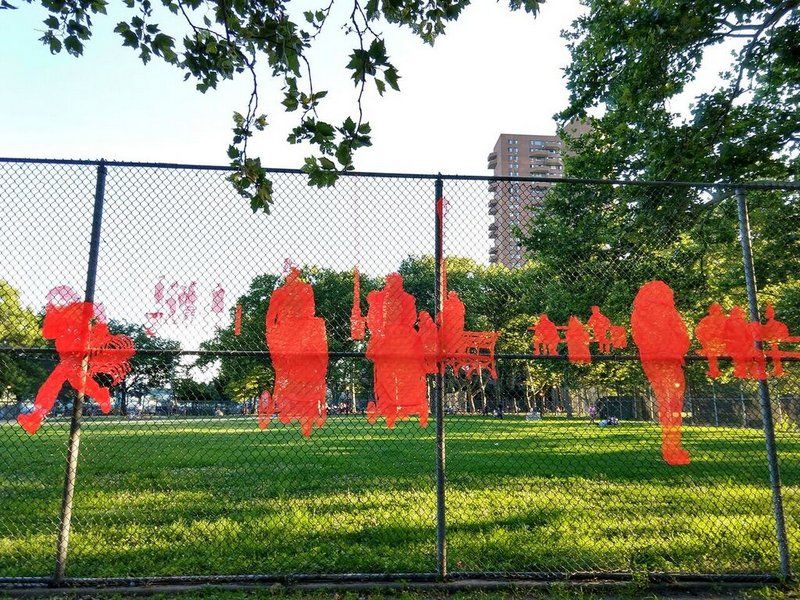
Photo by Harumi Ori courtesy of NYC Parks
From now until July 9, 2019, Harumi Ori’s I Am Here will be on view in East Harlem’s Thomas Jefferson Park. The artist states that the sculptures are inspired by a poem by Japanese poet Michio Mado, which advances the idea that meaning can be found in existing in everyday life. Ori began the project by taking a photo of an ordinary location every day from the same viewing position and at the same time. She was inspired by the photos which each exhibited unique variations, despite the fact that the conditions in which the photo were taken were held constant.
The installation consists of orange industrial mesh that the artist folded and sewed to create a three dimensional portrait of the park in a way that mirrors the shapes and motions of the people and inanimate objects that fill the park.
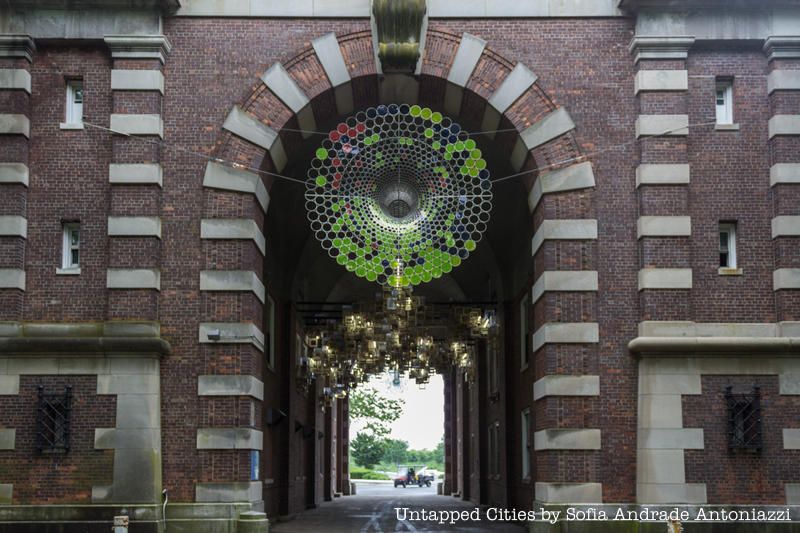
Never Comes Tomorrow by Jacob Hashimoto in the Liggett Hall archway
In June, Governors Island unveiled two impressive site specific art installations, both by Jacob Hashimoto. In the archway of Liggett Hall (a former Army barracks building that is the size of the Chrysler Building on its side), is an installation made of hundreds of wooden cubes and enormous steel funnels. The work, entitled Never Comes Tomorrow is meant as a threshold that connects Governors Island’s Historic District and the new parks, which include The Hills.
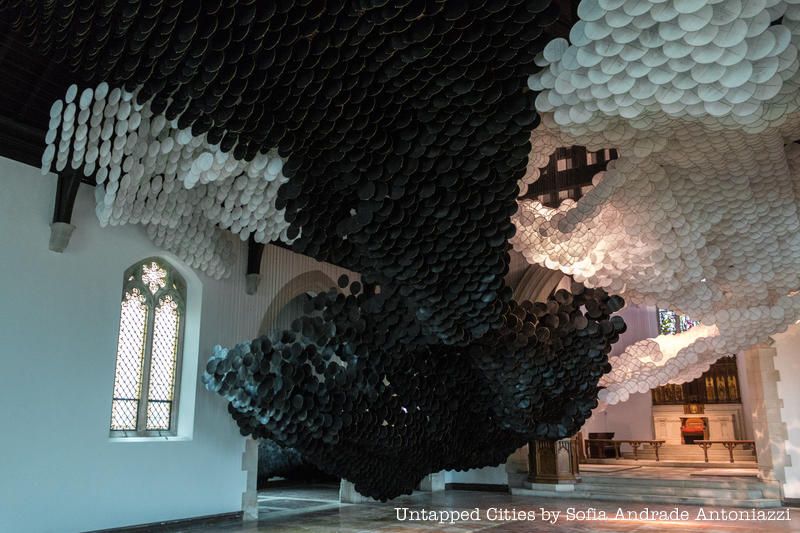
Eclipse, also by Jacob Hashimoto in the St. Cornelius Chapel on Governors Island
Another work by Hashimoto, Eclipse, is located in the St. Cornelius Chapel, featuring thousands of rice paper kites that adapt to the architecture of the historic space, while obscuring the elements. Eclipse was originally installed at the 57th Venice Architecture Biennale at the Palazzo Flangini.
The two installations will be viewable until October 31st this year.
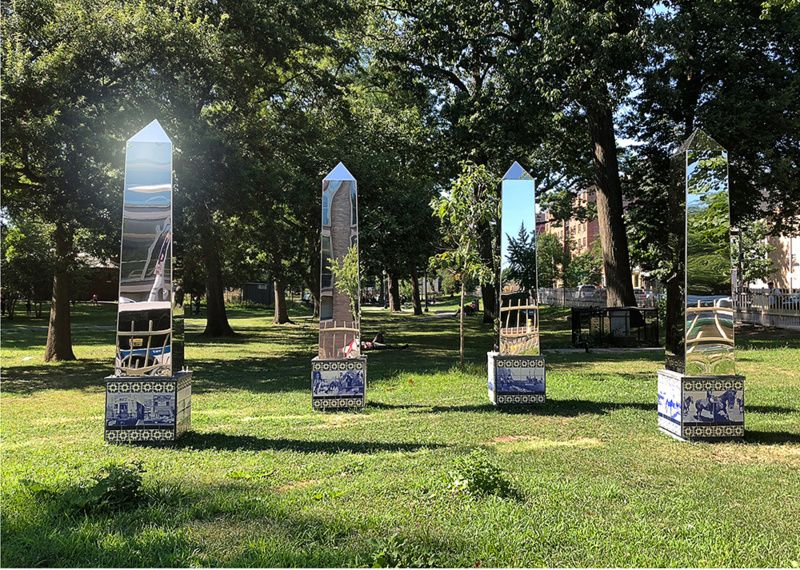 Photo by Rose DeSiano Courtesy of New York City Department of Parks & Recreation
Photo by Rose DeSiano Courtesy of New York City Department of Parks & Recreation
Rose DeSiano’s Absent Monuments, also part of the UNIQLO Parks Expressions Grant, is on view in Queens’ Rufus King Park until June 2019. The installation is constructed of several mirrored obelisks that feature Dutch Delft photographic tiles that explore the history of the park, as well as floral tiles inspired by Native American patterns. The mirrored surfaces confront the viewer with their reflection and subtly prompt them to reflect on their own identity and their situation within the history of Jamaica, Queens, which is full of colonization, war, abolitionism, immigration, and rural urbanization. Simultaneously, the tiles pay homage to the history of Native American people and address the patterns of cultural displacement that have occurred in Queens.
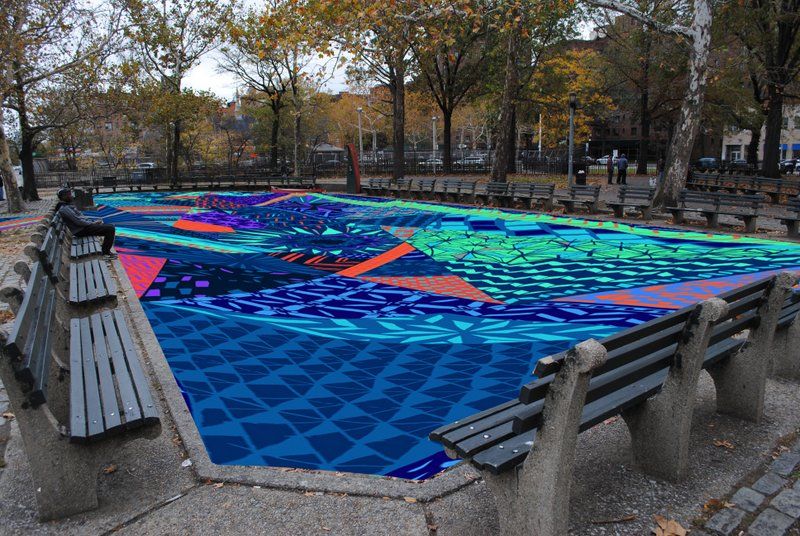
Courtesy of NYC Parks
An installation by artist Cara Lynch titled I’m So Happy You’re Here has just debuted at Virginia Park in the Bronx as part of the UNIQLO Park Expressions Grant program. Lynch has created numerous public art projects, which include pieces here in New York. A common theme throughout her work is that of tension; in I’m So Happy You’re Here, she explores tensions between high and low and the contrast of public and private space. The mural, which is painted on the ground, contains patterns that are reminiscent of traditional parquet flooring, a status symbol found in the homes of wealthy individuals.
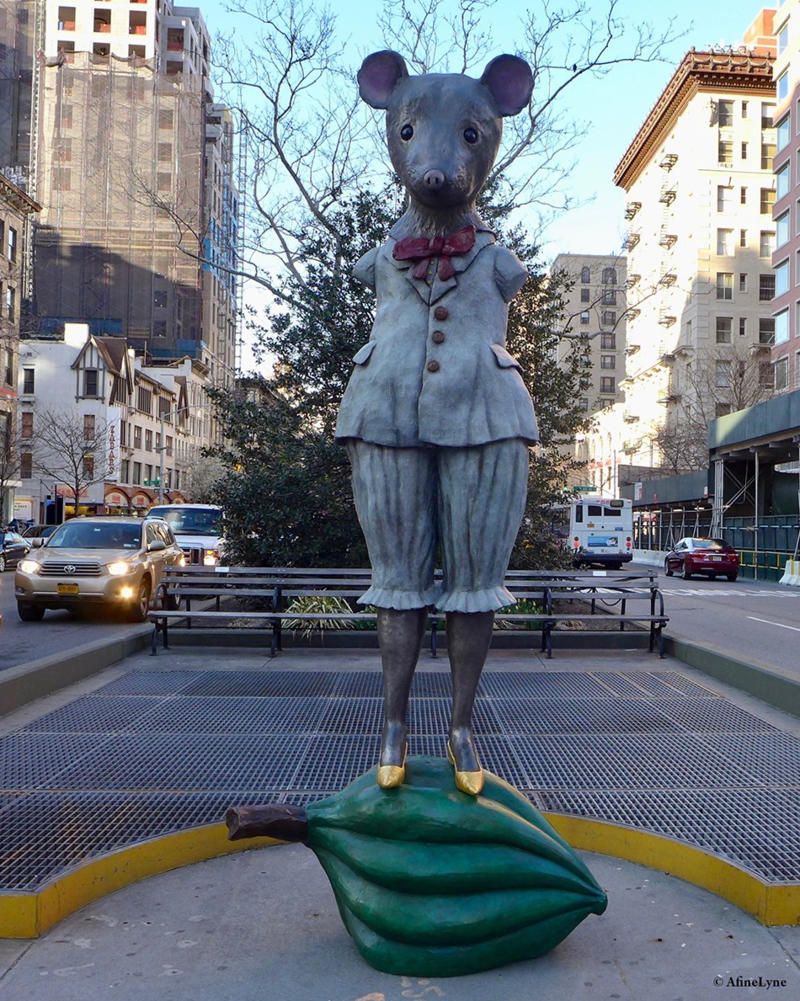
‘Ms. Mighty Mouse’ on 79th Street; Photo by Lynn Lieberman/Gotham to Go
The Broadway Mall Association debuted Kathy Ruttenberg on Broadway: In Dreams Awake. The exhibit includes six works featured on the Broadway center mediums, located on 64th, 72nd, 79th, 96th, 117th, and 157th Streets.
Each sculpture — described as a combination of human, animal and plant forms — is made from cast silicon bronze, and range between 6 feet to 15 feet in height. (Some even feature LED lighting!) The sculptures take inspiration for their surroundings; for instance, Ms. Mighty Mouse on 79th Street dreams of the cheese at nearby Zabar’s and All the World’s a Stage, which depicts a singing figure, is an allusion to the nearby Lincoln Center.
The exhibit will be on view through February 2019.
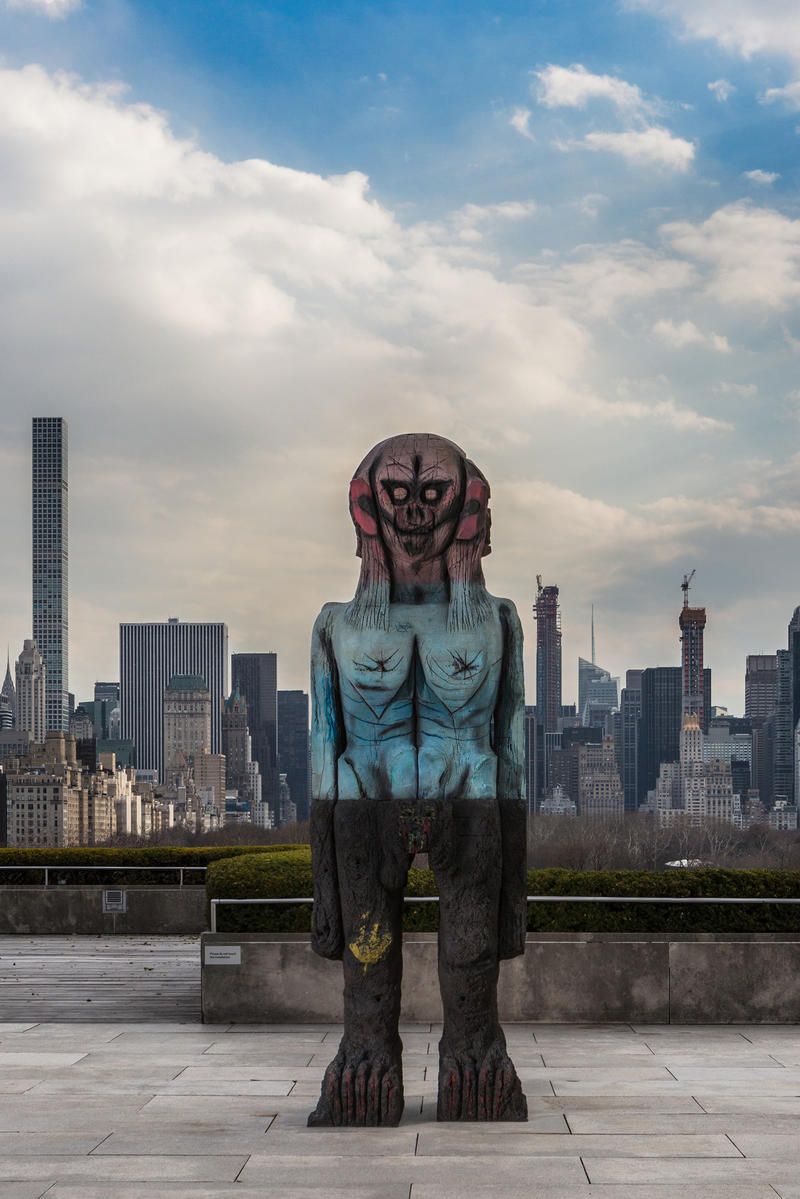 Image by Hyla Skopitz via The Metropolitan Museum of Art
Image by Hyla Skopitz via The Metropolitan Museum of Art
The Metropolitan Museum of Art’s rooftop site specific installation, titled We Come In Peace, is now on view to the public until October. Created by Pakistani artist Huma Bhabha, this rooftop installation is The Met’s sixth in a series of site specific commissions for the outdoor roof space. The sculptures consist of the 12-foot-tall five-headed intersex figure “We Come in Peace,” and the 18-foot-long prostrate Benaam — an Urdu word that translates to “without name.”
We Come in Peace borrows its title from the classic American science-fiction film The Day The Earth Stood Still (1951)

, a tale of first contact between humans and aliens. The sculptures are cast in bronze, but were initially handcrafted to scale by Bhabha using ephemeral materials, such as cork, Styrofoam, air-dried clay, and plastic.]
The exhibit will be on view at The Met’s rooftop garden until October 28th, 2018.
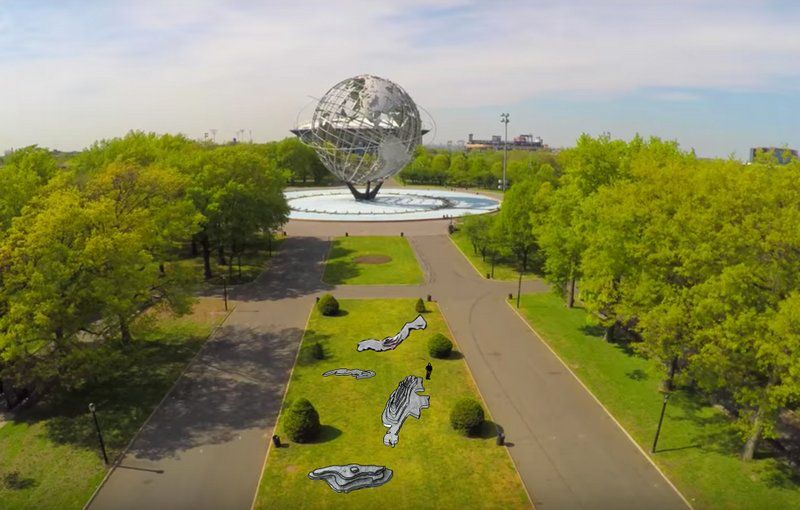
Courtesy of NYC Parks
Around the Unisphere in Flushing Meadows Corona Park sit the sculptures that comprise Zaq Landberg’s Islands of the Unisphere (yet another of the UNIQLO Parks Expressions Grant program). The Unisphere monument, a fixture of the park, is a large sculptural globe with recognizable land masses, but without labels and borders. Landberg expanded on this famed monument by choosing islands off of the Unisphere, recreating them at scale, and placing them horizontally on the grass. The islands act as seating, stages, and meeting places, community spaces that encourage people to forge connections and reflect on the tremendous diversity of Queens.
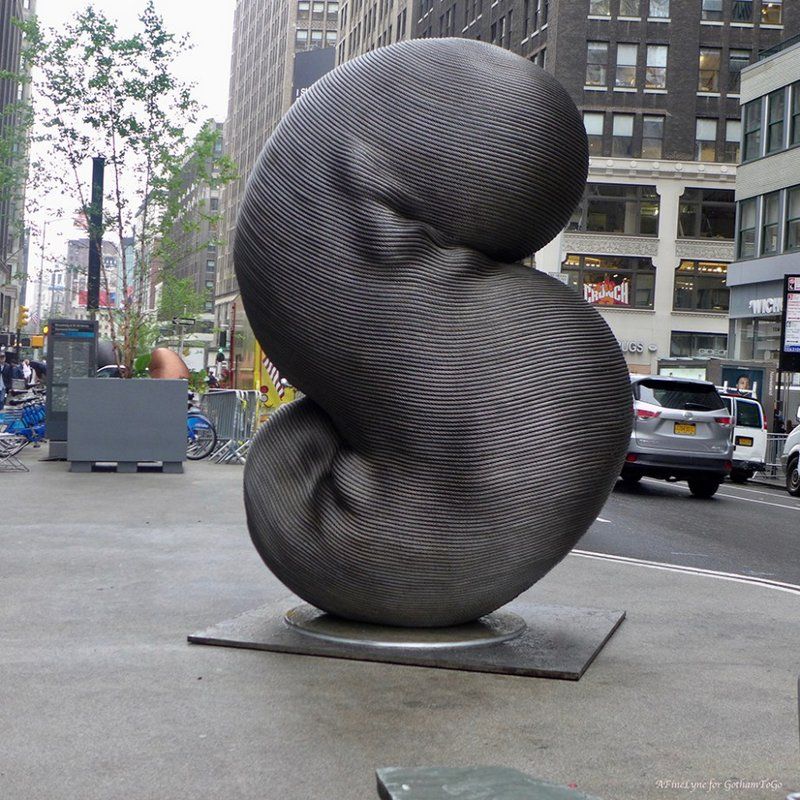 Photo by Lynn Lieberman/Gotham to Go
Photo by Lynn Lieberman/Gotham to Go
The Garment District Alliance and NYC DOT’s Arterventions has brought seven of Taiwanese artist Kang Muxiang’s large works to the Garment District Plazas between 36th Street and 38th Street. The sculptures in the series Rebirth are made from discarded steel cables from Taipei 101, Taiwan’s tallest skyscraper and the world’s tallest building from 2004 to 2010. The largest sculpture is over 10 feet tall and 3,500 pounds in weight. You can read more about each sculpture on the Garment District Alliance website. The works will be on display through September 15th, 2018.
This is the second Taiwanese artist to grace the malls of the Garment District, with Hung Yin’s A Fancy Carnival in 2016.
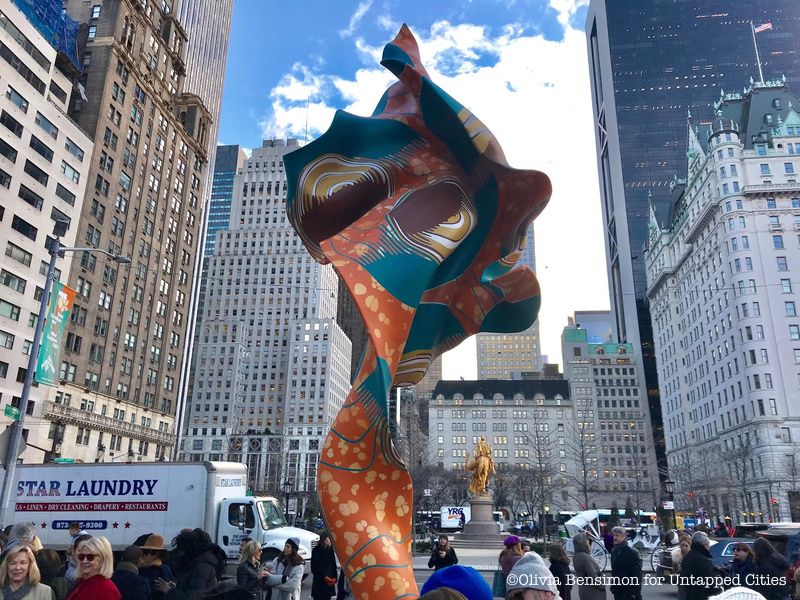
Earlier this year, British-Nigerian artist Yinka Shonibare MBE RA debuted Wind Sculpture (SG) I, a part of his Wind Sculpture series, in the Doris C. Freedman Plaza, which marks the southeast entrance to Central Park.
Shonibare, one of the best-know contemporary artists in Britain, refers to himself as a “cultural hybrid”, resulting from his ties to both Nigeria and England overlaid with the web of global relations that have stemmed from politics and trade that have shaped his upbringing and his art. In Wind Sculpture (SG) I, Shonibare took the visual of a piece of fabric blowing in the wind and rendered it into a piece of solid fiberglass. The monumental sculpture features a hand-painted pattern inspired by Dutch wax batik print fabric in order to evoke what Shonibare himself refers to as “multilayered identities.”
The exhibit will run until October 14, 2018.
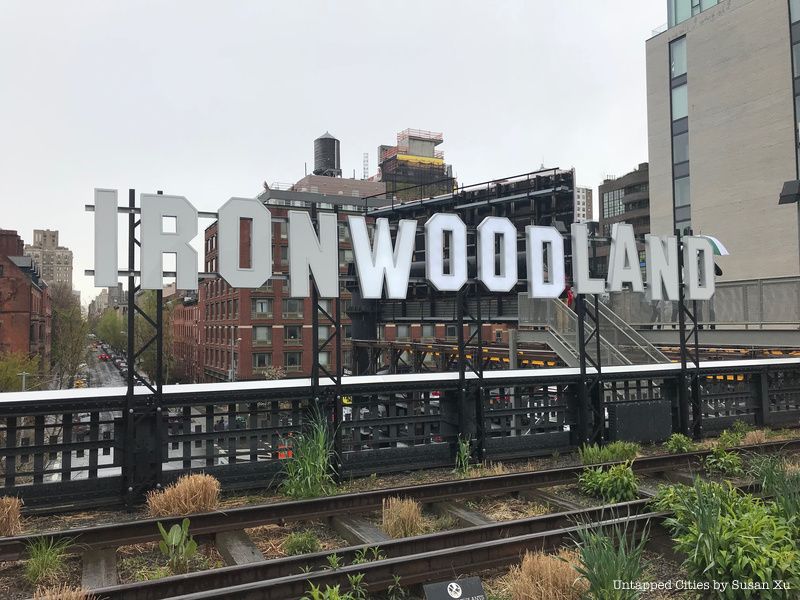
AGORA on The High Line is an outdoor group exhibition by nine artists explores the role of art and artists in defining, creating, and using public space. The name of the exhibit is inspired by the same ancient Greek word, which literally translates to a gathering place — a fitting name as New York City’s public spaces have served as a home to a plethora of artworks over the decades, ranging from WPA murals to graffiti tags.
AGORA will focus on the power of art to change society. As such, it addresses current issues, including women’s rights, mass incarceration, the environment and immigration. For instance, the work above, “C.R.E.A.M.,” by Sable Elyse Smith, is an altered replica of the Hollywood Sign that reads IRONWOODLAND — a reference both to the Ironwood State Prison and to “Hollywoodland,” the segregated real estate development that was advertised by the original sign. The exhibit will be on view until March 2019 at various locations along The High Line.
Next, check out The Top 10 Secrets of the High Line.
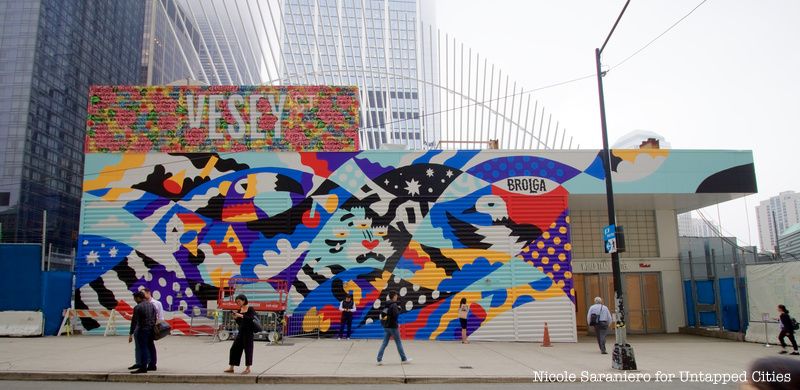
Vesey mural by Chinon Maria and Sebastian Mitre
While construction of 2 World Trade is on hold, a collection of corrugated metal sheds housing mechanical equipment have been spruced up by artists from around the world to make the area look less like a construction zone and more like a hip pedestrian throughway. The sheds, which are bounded by Greenwich, Vesey and Church Streets and the Oculus transportation hub, feature murals by Australian illustrator Brolga, Los Angeles-based artist Todd Gray, Korean-born Joohee Park, aka Stickymonger, the husband and wife team of Chinon Maria and Sebastian Mitre, Japanese-born, New York resident Riiisa Boogie, and Bronx native Hektad. When all of the murals are complete there will be 8 colorful works to see!
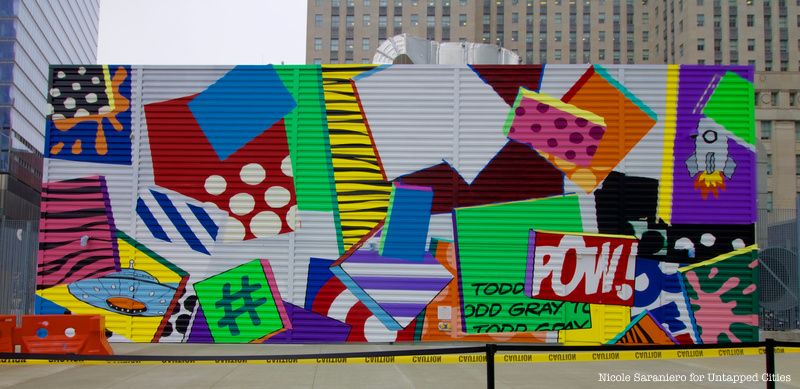
Mural by Todd Gray
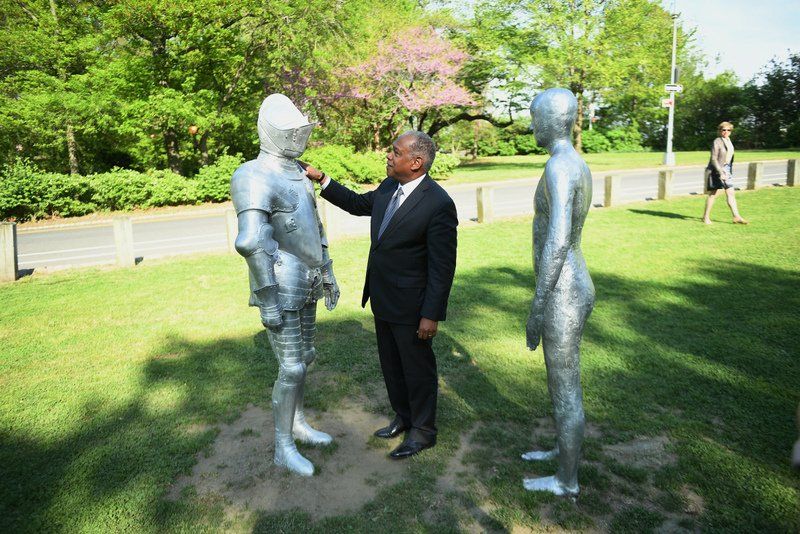
NYC Parks Commissioner Mitchell Silver with the ARMORS. Photo by Malcolm Pinckney via NYC Parks
Icelandic artist Steinunn Thorarinsdotti has created ARMORS, a site-specific installation for the Cloisters Lawn in Fort Tryon Park, featuring suits of armor cast from 3D scans of armors in the Metropolitan Museum of Art permanent collection. The three casts sit “in dialogue” with one another, according to the Fort Tryon Park Trust website, which has a description of the artist and her work:
“The project’s incorporation of armor—a form that is both distinctly iconographic and foreign to the artist’s own hand—marks an aesthetic and conceptual divergence for Icelandic Thorarinsdottir, who in her home country is a celebrated pioneer (the first female sculptor to have two solo shows at the Reykjavik Art Museum, 1982 and 1987) whose androgynous figure installations have since 1976 been mounted in dozens of prominent sites around Reykjavik and beyond.”
The works will be on display until September 13th.
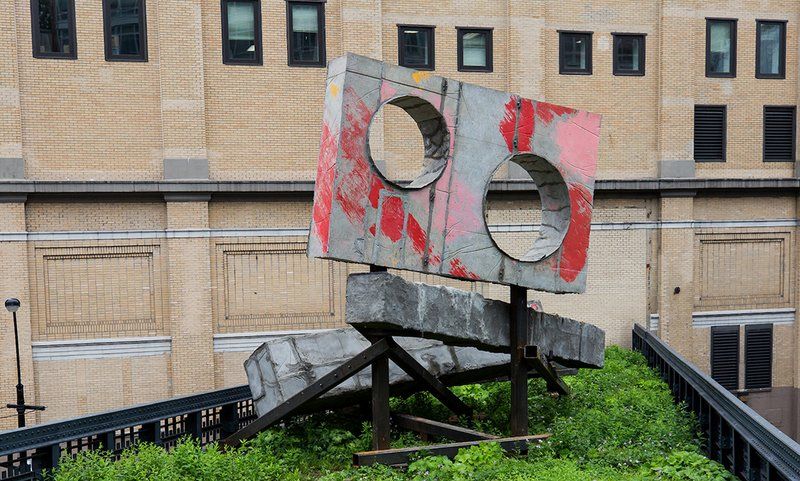
Phyllida Barlow’s prop. Photo courtesy the High Line
In addition to the Agora commissions we featured the last few months, the High Line launched two new installations at the end of May. Kerry Tribe’s Exquisite Corpse is a film that follows the entire 51-mile length of the Los Angeles River chronicling “the river’s neighbors—animal, human, and vegetal—and their stories with one minute devoted to each mile,” according to High Line Art. The film plays daily on The High Line at 14th Street at dusk from May 14 to July 18, 2018.
Then, Phyllida Barlow’s prop is a teetering concrete sculpture, reimagined from a work displayed at the 2017 Venice Biennale, and the first work to be displayed on the Northern Spur Preserve of the High Line at 16th Street, a section that once connected directly to a refrigerated warehouse that was part of the Nabisco cookie factory. Prop will be on view until March 2019.

During NYCxDesign Week, we were honored to be a partner of The Design Trust for Public Space in the launch of El-Space, a long-term pilot installation located under the Gowanus Expressway in Sunset Park at 36th Street and 3rd Avenue, just adjacent to Industry City. El Space is the product of a five year, critical exploration in how New York City can better activate the forgotten, unfriendly spaces beneath aging elevated infrastructure and culminates in this first pilot installation that showcases what an alternative walkway beneath the Gowanus Expressway could look like.
El-Space was designed with input from the diverse local community through charettes and on-site pop-up workshops, including work with students at Sunset Park High School and members of a Community Advisory Board.The design tests strategies for lighting, green infrastructure, and urban design for replicability, aesthetics, and of course, how the public uses and engages with it. El-Space will be installed for about a year, used to test and refine strategies for future permanent activations. For the passerby, it’s a cool visual addition to an industrial space and for the community, it has created a new meeting spot.
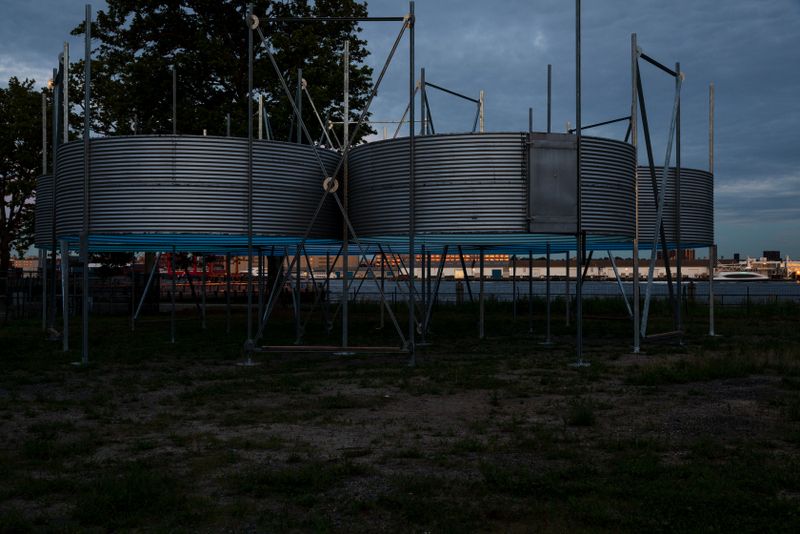
Photo by Lindsey Hadlock courtesy of Cornell University
Oculi, the winning piece of the 2018 City of Dreams competition, was unveiled on Governor’s Island in late June and will be on view through the fall. The City of Dreams competition encourages architects and designers to turn their visions and creativity towards sustainability and ponder environmental problems such as the depletion of resources.
The piece is constructed of discarded grain silos that are elevated to create a variety of shadow patterns, creating an art piece while evoking the imagery of New York’s industrial age. Sustainability is not just present in the construction of the piece, but also in its demolition, in which the the silos are projected to be repurposed for components of experimental housing.
 Photo by Alexander Atkins, courtesy of the artist
Photo by Alexander Atkins, courtesy of the artist
In July, Tribeca Park unveiled artist Rebecca Manson’s first public sculpture, a monumental public art piece titled Come Closer and the View Gets Wider. The piece consists of thousands of handmade, glazed porcelain parts that are fused together to create a magnificent eight-foot orb.
As the title and the composition of the piece suggests, the perspective at which the piece is viewed impacts the viewer’s perception. Each of the thousands of hand-crafted parts appear rather insignificant on their own and from afar, appear to blend in to the seamless piece. Collectively, the small pieces are crucial to creating the whole piece, which stresses the impact of small things coming together to create something greater. The work will be on display until July 2019.
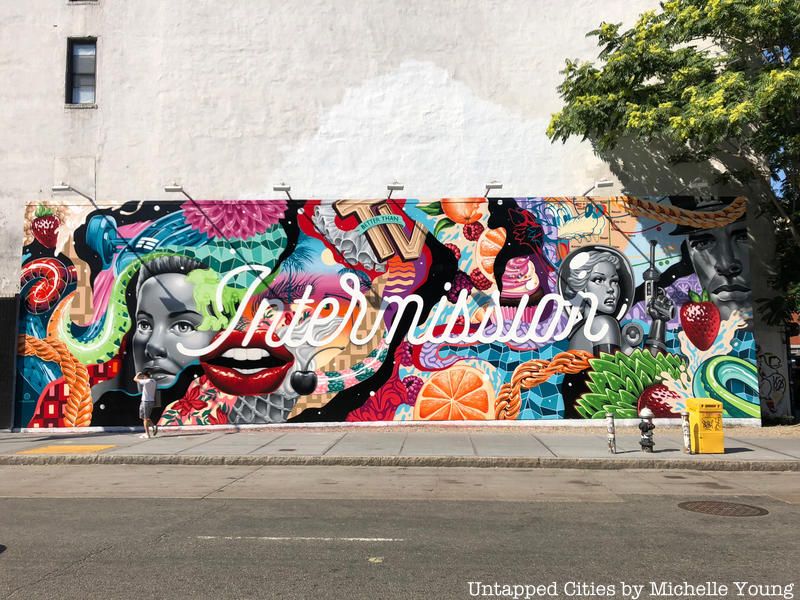
In July, acclaimed street artist Tristan Eaton completed work on a mural on the Houston/Bowery Wall, prompting much anticipation for the finished piece. The mural combines images and themes from cinema and pop culture, evoking the nostalgia of the cinematic Manhattan, where beauty and grunge simultaneously existed in the age of matinees and showgirls.
A notable detail of the mural is present in the background details. In the upper right corner of the piece a subway map is depicted in which notable street artists are listed as stops on the map, including Tats Cru, Crash, Futura, Daze and more.
Subscribe to our newsletter